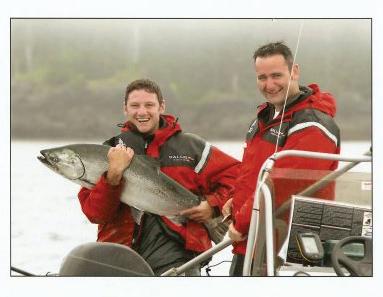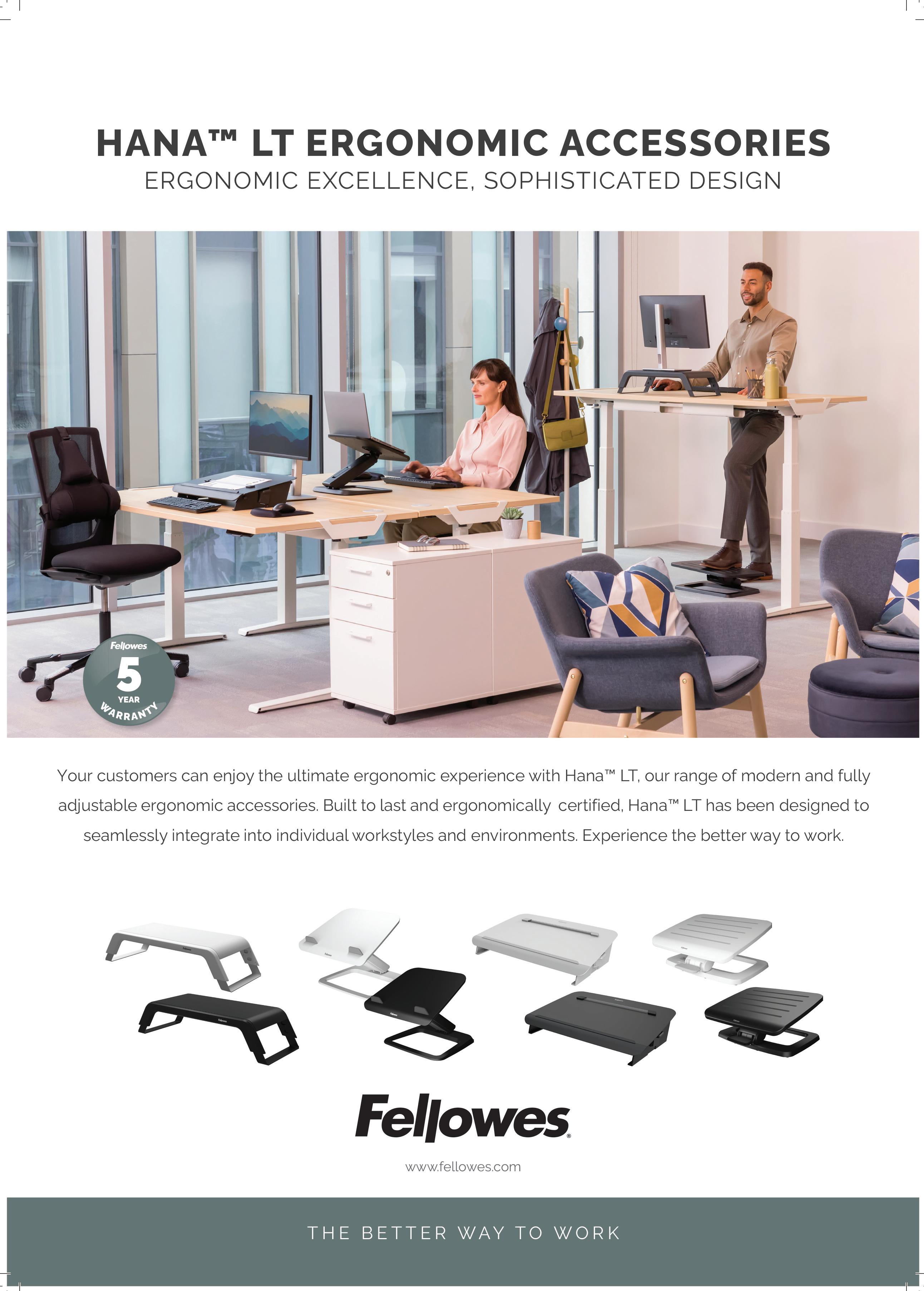business supplies and beyond

business supplies and beyond


business supplies and beyond

business supplies and beyond

Party time in the industry is always great fun –reuniting with old friends and colleagues, making new connections and business acquaintances and generally just getting out there and seeing what’s new and happening. Of course, I am being blasé because the partying – sorry, networking – is only a small part of exhibitions and conferences.
As the (supposed) summer months have rolled in, recent weeks have been bustling with activity. June kicked off with VOW’s Amplify event in Leeds (read VOW Amplified on page 10), followed by Nemo Office Club’s yearly conference, covered in It’s a knockout (page 46). Superstat’s summer event for dealers wrapped up the month (read Superstat drives dealer success on page 50).
There’s also been plenty happening on the charity and social front. The BOSS Business Supplies Charity Day, held

business supplies and beyond
business supplies and beyond
Workplace360 c/o OPI, Focus House, Fairclough Hall, Halls Green, Hertfordshire SG4 7DP Tel: 020 7841 2950
Follow us online:
Website: workplace360.co.uk
Linkedin: workplace360.co.uk/linkedin
The carrier sheet is printed on Satimat Silk paper, which is produced on pulpmanufactured wood obtained from recognised responsible forests and at an FSC® certified mill. It is polywrapped in recyclable plastic that will biodegrade within six months.

Workplace360 is printed in the UK by
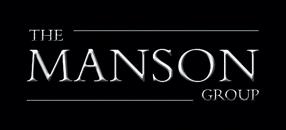
EDITORIAL
Workplace360 Editor
Michelle Sturman 020 7841 2950
News Editor
Andy Braithwaite +33 4 32 62 71 07
Assistant Editor
Kate Davies 020 7841 2950
OPI Editor Heike Dieckmann
While [...] events combine hard work and fun, they belie the more serious nature of our business
at a new venue, was a resounding success judging from the photos – clearly, everyone had a great time. You can read more about this in A day of celebration & generosity (page 48). In Pedal power (page 49), cyclists participating in the Ride of Life raised crucial funds for the Institute of Cancer Research by conquering the roads of Bedfordshire. Meanwhile, The Society of Old Friends recently hosted its Summer Lunch in London and will head to Manchester in September for the Summer Clachan.
While all these events combine hard work and fun for all involved, they belie the more serious nature of our business: finding new avenues to sell products and services. There’s still plenty of life in our more traditional products, as Write moves (page 39) reveals, with sectors like warehousing, hospitality and healthcare ripe for consideration in this category.
Meanwhile, Prints charming on page 28 delves into the print space, where there are opportunities in document management systems, cloud printing, wide-format, label, and packaging printing. Of course, successful diversification requires a robust business and sales strategy.
On this note, I’m thrilled to announce a new series of articles by consultants TSP, in partnership with Workplace360, addressing this subject. Part I, The building blocks to success (page 34), written by Adam Noble, sets you on the right path to developing a clear strategy.
Michelle Sturman, Editor
SALES & MARKETING
Head of Media Sales
Chris Turness 07872 684746
Chief Commercial Officer Jade Wilson 07369 232590
Commercial Development Manager Chris Armstrong
Digital Marketing Manager Aurora Enghis
PRODUCTION & FINANCE
Head of Creative
Joel Mitchell
Finance & Operations
Kelly Hilleard
EVENTS
Events Manager
Lisa Haywood
PUBLISHERS
CEO
Steve Hilleard 07799 891000
Director
Janet Bell 07771 658130
Executive Assistant
Debbie Garrand
OPI publication EMAIL US... To email any of the Workplace360 team, use the following: first name.surname@ workplace360.co.uk
TSP Director Adam Noble discusses the importance of having a clear strategy for growth and competitiveness

Workplace360 speaks to TSP Director Gary Naphtali about the company’s mission to enhance sales and business performance
Nemo Office Club’s latest conference seamlessly blended business insights
Heart of the industry The BOSS Business Supplies Charity and the Ride of Life cycle ride celebrate another year of successful and memorable charity events
Event This year’s Superstat conference was rich with knowledge sharing
Exposed! Garry Wright from CTS Wholesale

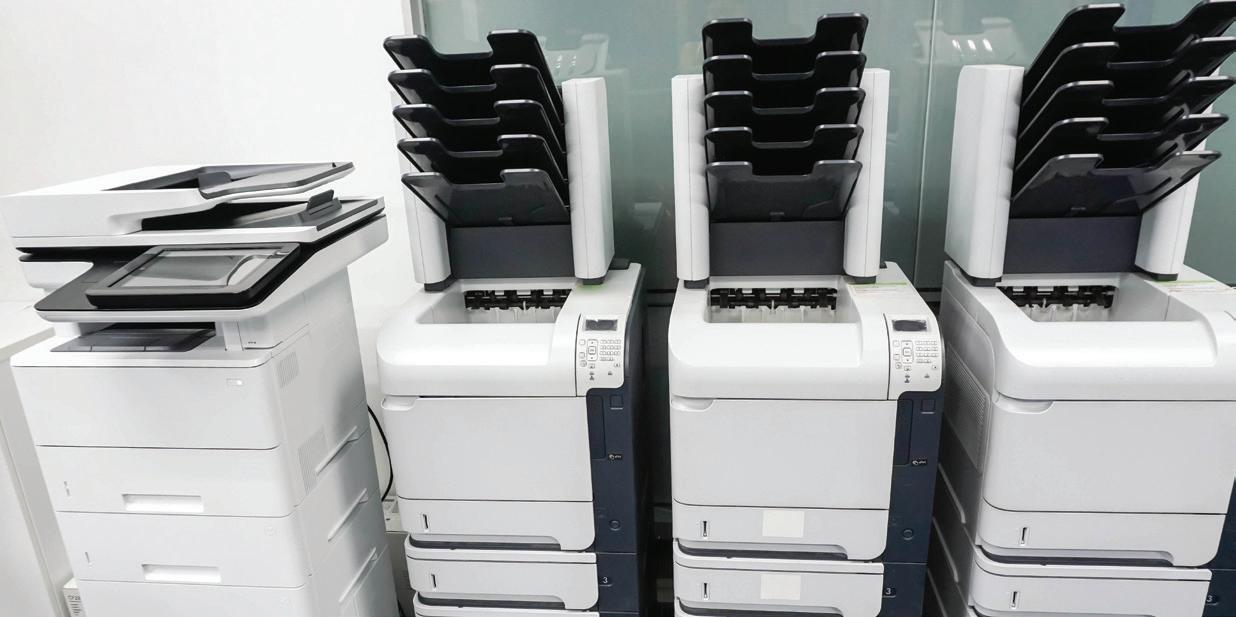
Office Power’s Helen Batstone reveals how identifying your ‘why’ can transform your approach to
and business Brother UK Managing Director Phil Jones reflects on his 30 years with the company

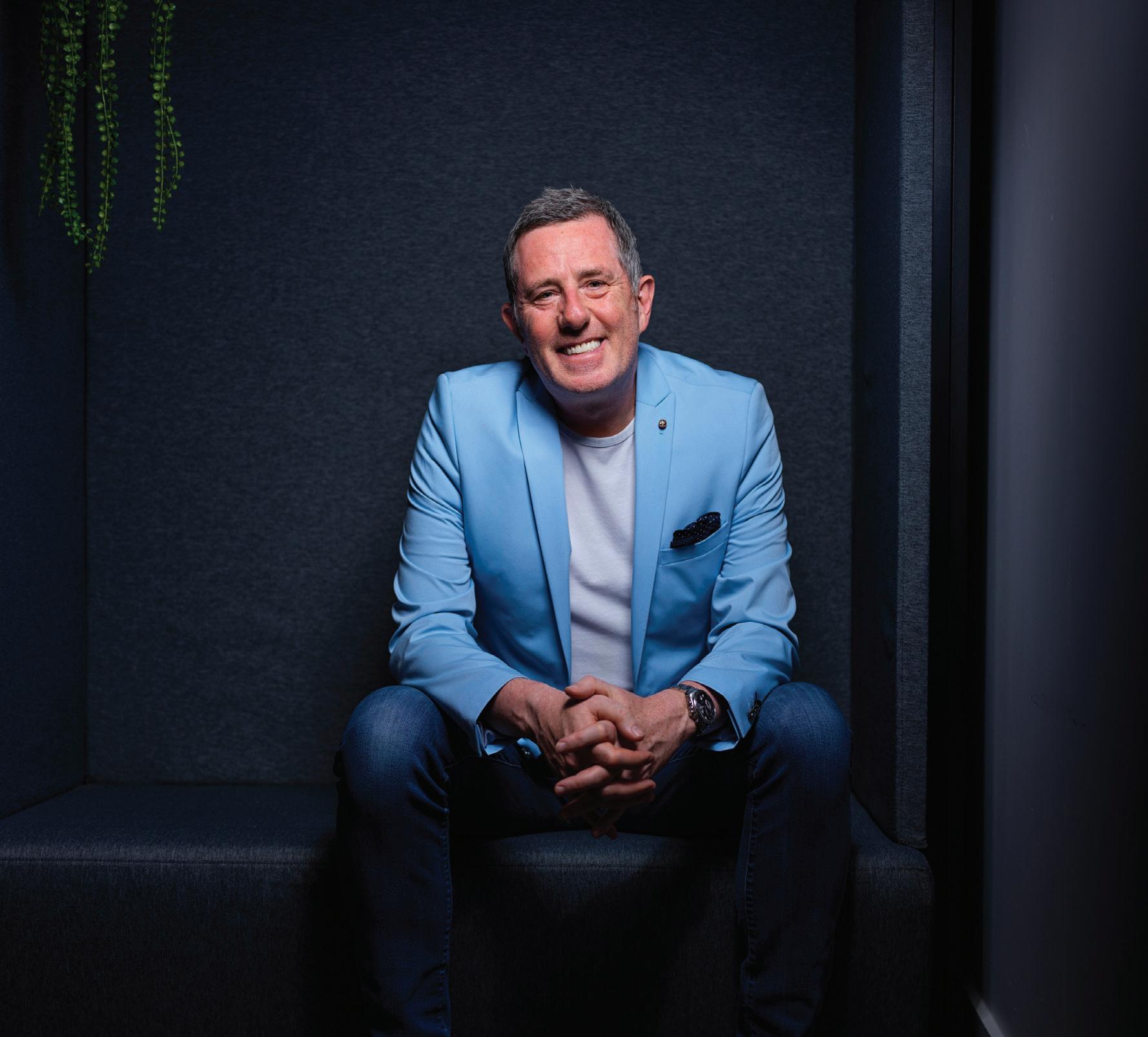
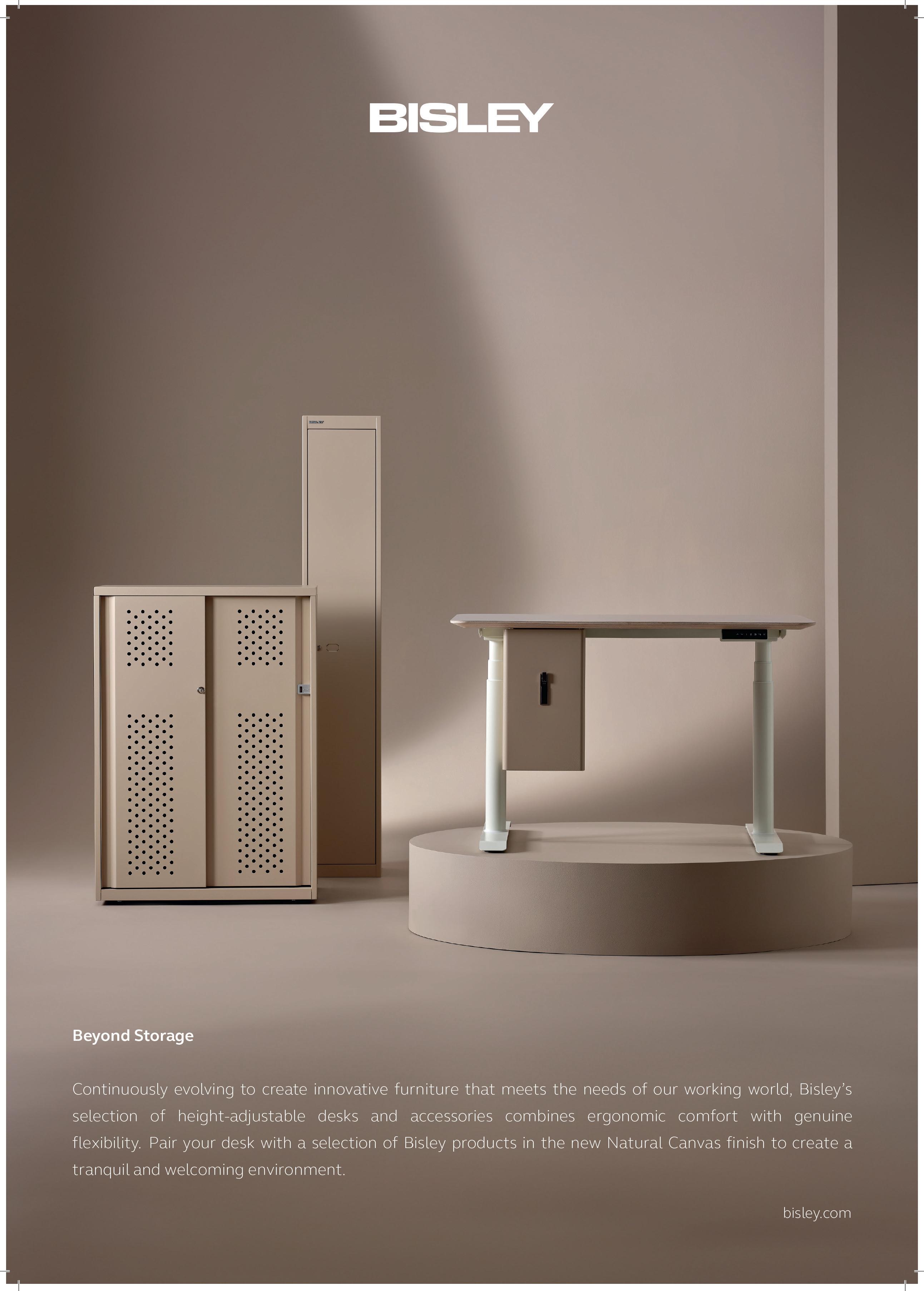
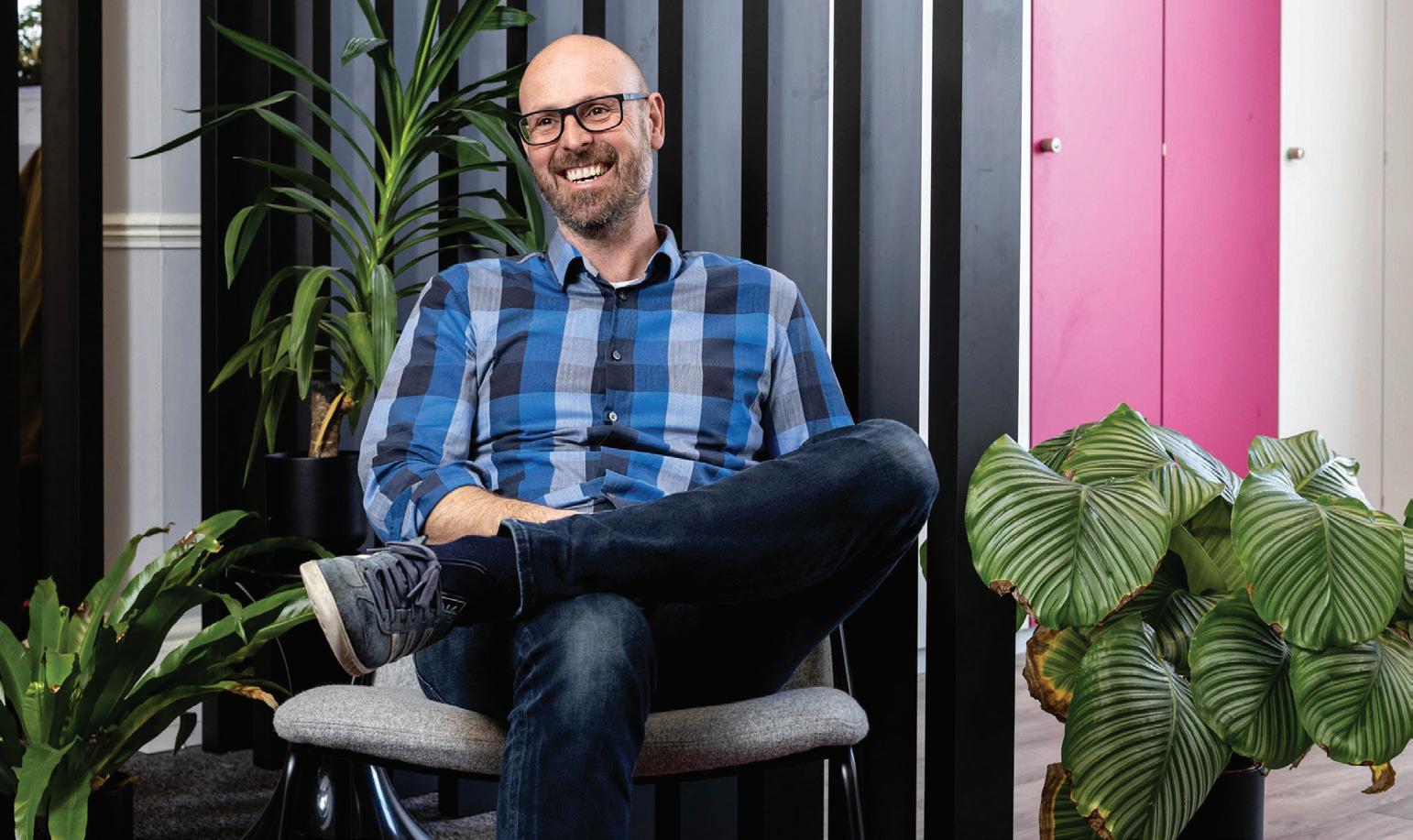
Kent-based online dealer Paperstone has acquired the book of business of 3WM Supplies. Effective immediately, all 3WM Supplies customers will start the transition to Paperstone’s platform. 3WM’s Sales and Customer Care Manager Jamie Tarren has also joined Paperstone.
“Rob Turner has done a fantastic job in building a well-respected business and I thank him for letting us take the reins,” said Paperstone founder and CEO Jim Brown. “Our priority is to provide exceptional service and value. We’re confident the additional benefits Paperstone offers will significantly enhance the overall customer experience for the 3WM Supplies customer base.”



Scottish Highlands dealer James Dow Office Supplies has bought Invergordonbased The Stationery Stop. The deal is the second for James Dow in the past couple of years, following the purchase of Moray Office Supplies.
The Stationery Stop had been on the market since last summer, with coowner Fiona Duff looking to retire. Fellow co-owner Alison Cormack is staying on with the business following the acquisition by James Dow, which is celebrating its 150th anniversary this year.
In a strategic move to bolster its presence in the office channel market, 3M has announced the appointment of Mollie Lacey and Claudio Magalhaes to leadership positions within the North Europe Consumer Business Group.
Lacey transitions into her new role as Key Account Executive for the UK&I Retail & Office Channel after six years in customer service within 3M. At just 25 years old, she brings a wealth of experience and a keen customerfocused approach to her new responsibilities in sales. “I am confident that my customer service expertise will continue to serve me well, and I am committed to achieving outstanding results within the business supplies industry,” Lacey remarked.
Claudio Magalhaes joins 3M as UK&I Retail & Office Channel Key Account Manager, bringing a rich and varied background to the role. With experience across industries such as the motor trade, IT, renewable energy and private sector project management, he is well versed in operations, lean processes, sustainability and customer engagement.
Talking about the new role, Magalhaes commented: “Joining 3M is a significant milestone in my career. I am excited about the opportunities for progression and eager to contribute to the company’s success in the business supplies industry.”
3M North Europe Shopper Marketing Lead Simon Williams expressed his confidence in the new appointments: “Claudio, who has just joined our sector, will oversee the direct relationships with wholesalers and contract stationers, while Mollie leads the dealer groups and education customers. Both bring fresh perspectives and energy to the team and are poised to drive our continued achievements in the office channel market.”
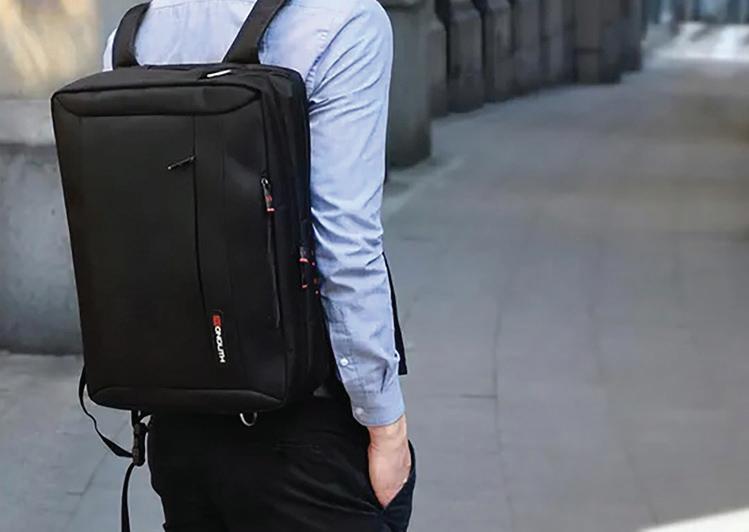
Germany-based business machines and luggage supplier Monolith Global has agreed to acquire the assets of Falcon International Bags. Falcon was established over 30 years ago in the UK and most recently has been developing products in the business luggage category.
Its i-stay range, for example, has received a commendation from the Royal College of Chiropractors for its potential to help users avoid musculoskeletal discomfort. i-stay products will be available from Monolith from the start of July, the supplier’s VP of Sales and Marketing Tim Bonnett confirmed.

Watson joins RAJA Office
RAJA Office has named former Lyreco Group Marketing Director John Watson as Purchasing and Assortment Director for its businesses across Europe. The role became available earlier this year following the departure of Rogier Koning, with ex-Staples purchasing and merchandising exec Sharon Tan filling in on an interim basis.


After almost 30 years as Managing Director, Michael Robinson has taken on the role of Chairman at sales, marketing and distribution group Robinson Young. The day-to-day running of the business will now be handled by Kevin Sperling (left) and Jon Bridge (right). Sperling, formerly Sales Director, has been appointed Managing Director; while Bridge, previously Financial Director, will lead the finance and operations functions.



Richard Smithers (left) has been promoted to Managing Director of Victor Stationery. He has 30 years’ experience in business products sales, including spells at Spicers and VOW. He joined the vendor at the beginning of 2022 as Sales Director.
In addition, Mark Harper (right) joins the company as European Key Account Manager from HSM, where he spent the past eight years leading the UK shredder sales team.

Pukka Pads names MD
Pukka Pads has promoted Darryl Corbin-Jones (pictured) to the role of Managing Director. He will oversee all of the company’s territories, freeing up more time for Group CEO Chris Stott to focus on strategic initiatives.

YPO makes procurement appointment
Public buying sector organisation YPO has appointed Michelle Walker as Head of Procurement Services.
In this newly created role, Walker will lead on forming strategic stakeholder partnerships, nurturing strong internal relationships and collaborating with customers within the YPO supply chain.

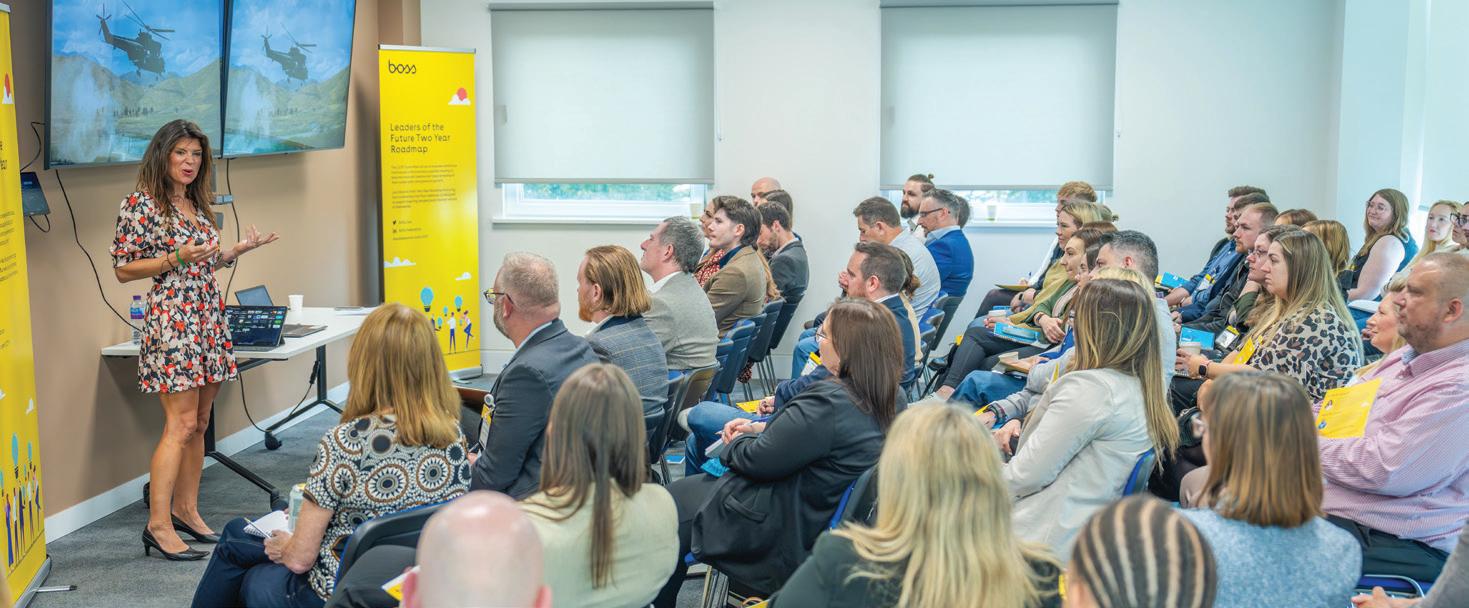
The BOSS Leaders of the Future (LOTF) Committee announced new leadership and members at its first in-person event of 2024 on 13 June. Approximately 80 delegates met at the ACCO Brands HQ in Aylesbury for the one-day conference.
The agenda included two keynote speakers: RAF Squadron Leader Sarah Furness and Brother UK Managing Director Phil Jones. In the afternoon, interactive roundtables were led by key industry figures: Ian Buckley, Managing Director at Prima Software, Jo Marshall, Executive Director at YPO, Stuart Derbyshire, CSO at OT Group UK & Ireland, and Jeanette Caswell, Managing Director at Office Friendly.
The event was the last to be led by co-Chairs Alex Stone, Sales Director at Office Friendly, and Rachael Lewis, Sales Optimisation and Partnerships Director at OT Group, who completed their tenure after two years at the helm. Both will remain members of the Committee. Taking over as co-Chairs are Amy Remmer, Account Director at VOW Wholesale, and James Day, Managing Director at Durable UK. Incorporating the former and current co-Chairs, there are 12 committee members, including five new people:
• NEW – Callum North, Graphic Design Manager, Office Friendly
• NEW – Fred Fielding, Account Manager, Heatons Group
• NEW – Kate Davies, Assistant Editor, Workplace360 & OPI
• NEW – Paulette Blakey, Category Manager, Exertis Supplies
• NEW – Shaun Tidman, Head of Sales, Avery UK
• Jason Jones, Customer Business Manager, Nestlé Professional
• Jack Massey, Membership Advisor, BOSS Federation
• Kristian Danielson, Key Account Manager, BIC
All change at Hopax Europe
Hopax Europe Sales and Marketing Director Stuart Seymour (pictured) retired at the end of June after 34 years in our industry. Taking on the role of European Sales Director is Sylvia Wu, while Alistair Hughes-Rixham has been promoted to European Sales and Marketing Manager.
There have been two recent developments at distributor JGBM: an acquisition and a new hire. The company has purchased the business of Integrity Services, a Birmingham-based distributor that serves a number of categories. The transaction – the financial terms of which were not disclosed – has enabled former Integrity Managing Director Alan Wilson to retire. JGBM said the acquisition was complementary and will expand its reach.
Meanwhile, the Plymouth-based company has appointed Dan Burton as Head of Alliances. Burton is an experienced exec in the IT sector and joins JGBM after 12 years at CCS Media. Head of Alliances is a new position at JGBM. It involves strengthening relationships with brands and resellers in the IT channel through strategy development, relationship management, deal structuring and negotiation.

With feminine hygiene growing in importance in the workplace, sales and marketing agency Highlands now represents Ireland-based company Sanni Bin in Europe. Sanni Bin – developed by a team of hygiene professionals – is a discreet, eco-friendly sanitary waste disposal solution that aims to overcome the inconveniences of existing systems.
It is manufactured from 100% biodegradable corrugated cardboard, ships in a flat box and eliminates the need for conventional PVC bins to be used in the disposal process.
Highlands will now look to use its European network to distribute the brand. Its team will work to gain placements and drive sales in B2B distribution channels, focusing on jan/san and office resellers.
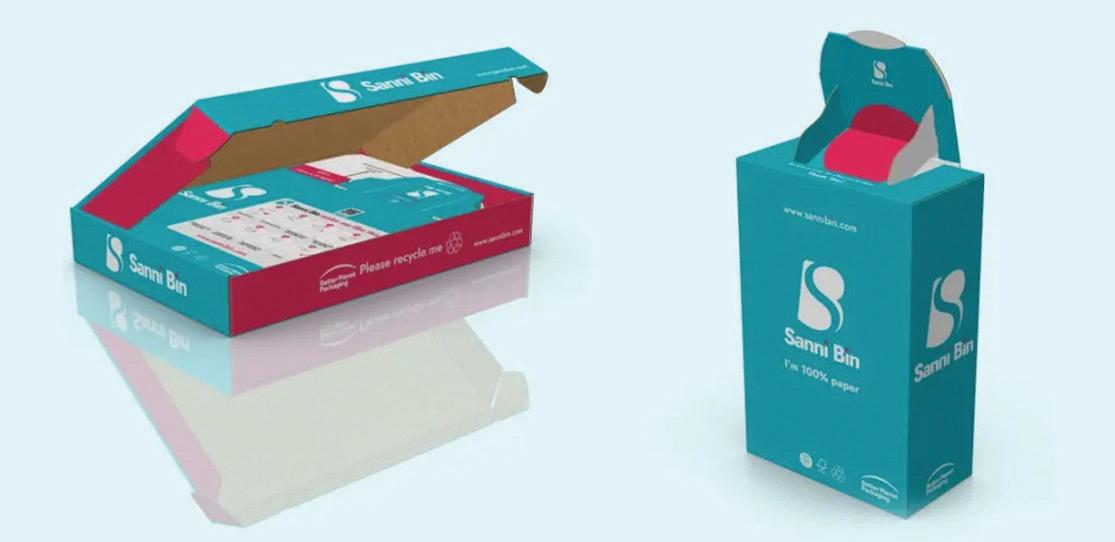
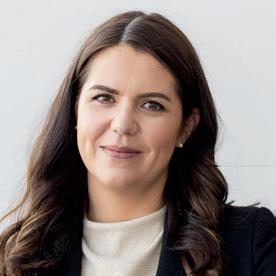
Senior appointment at Codex
Ireland’s leading independent dealer Codex has promoted Aisling Murray to the role of Head of People and Culture. She joined the company as HR Business Partner in 2020 and was instrumental in establishing the company’s in-house HR department.

Industrial distributor RS has appointed a new Managing Director for its UK and Ireland operations. Taking on the role is Raj Patel, the former COO of Distrelec, acquired by RS in a £310 million deal last year. Since then, he has been leading the integration of Distrelec into the RS Group.
Former UK & Ireland Managing Director Emma Botfield has moved on to a new group role at the distributor, leading process harmonisation, delivery and execution.

The European Office Products Awards (EOPA) have opened for entries and nominations – and two new awards are up for grabs. Entering its 24th year, the annual EOPA recognise the most exceptional products, companies and people in business and workplace supplies. In total, 13 EOPA trophies will be awarded during a gala dinner in Amsterdam, Netherlands, on 11 March 2025.
The Best Workplace addition acknowledges the growing understanding and appreciation of a positive workplace culture. Meanwhile, Online Reseller of the Year has been introduced to highlight exceptional players that primarily operate online.
To ensure the very best people are recognised by our industry, four individual awards will also be presented to executives at various stages of their careers.

The deadline to submit entries and nominations is 13 November. For more information about the EOPA, including how to enter and book a place at the awards dinner, visit opi.net/EOPA2025.
Meanwhile, entries are now being accepted for the BOSS Awards 2024. This year’s awards presentation takes place on 28 November at a new venue – The Eastside Rooms in Birmingham. During the evening, awards will be presented in 17 categories. The deadline for submitting entries is 16 August.
For more information and details on how to enter the awards and book places at the ceremony, visit: bossfederation.com/events/boss-awards.html.
For tips and tricks on writing entries for awards, read Workplace360 ’ s guide to entering awards, available online at workplace360.co.uk/awardstips

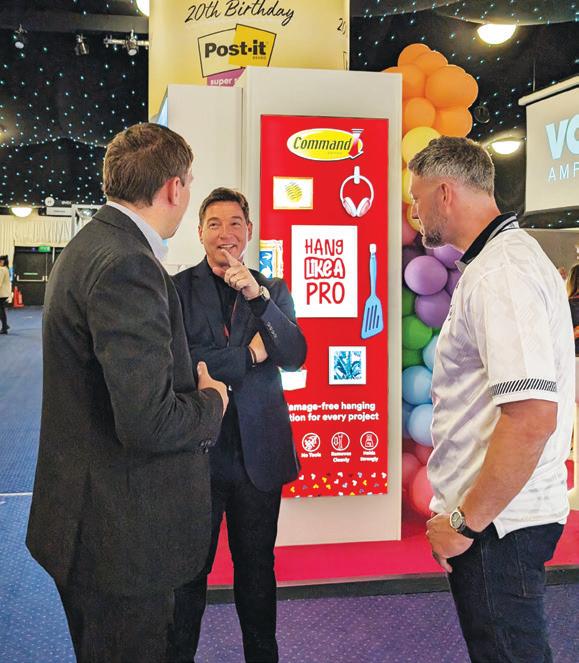


VOW Amplify 2024, hosted by VOW Wholesale, took place on 5 June at Elland Road, home of Leeds United. This year’s theme, centred on sustainability, highlighted the increasing importance of environmental responsibility in the workplace supplies industry, with exhibitors tailoring their product selections and messages around their environmental stories.
Headline sponsors ACCO Brands, Reckitt and 3M supported the event, which featured a diverse range of products, from workwear and furniture solutions to period products and the latest catering suppliers.
Exhibitors displayed a variety of innovative products aimed at enhancing workplace efficiency while maintaining a commitment to sustainability. The focus was on reducing carbon footprints, utilising recycled materials and promoting environmentally friendly products. With more than 70 key exhibitors to interact with, dealers had the opportunity to experience hands-on product demonstrations and gain firsthand knowledge of the latest offerings.
A notable highlight and amusing topic of discussion was the inclusion of a condom in the welcome bag. It certainly showcased VOW’s determination to diversify its product range – which, according to the
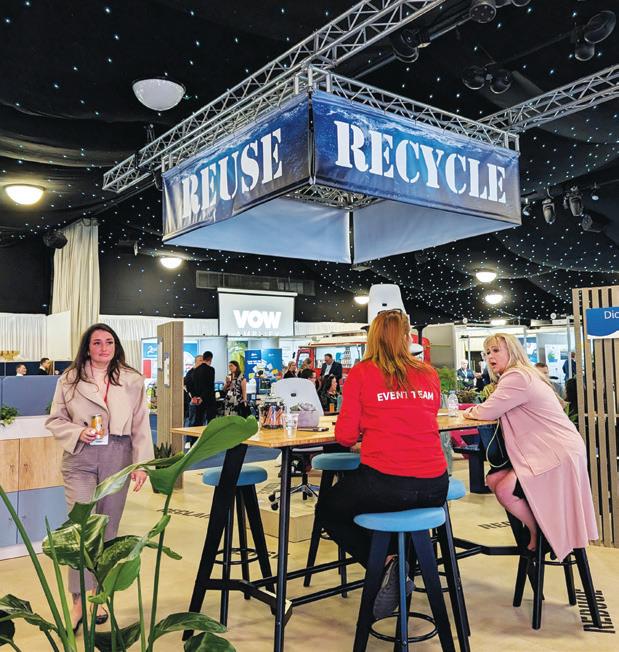
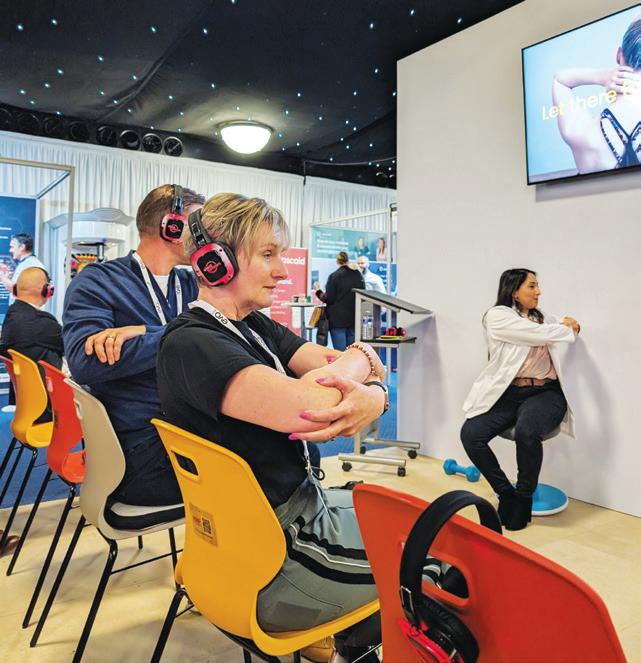
wholesaler, will include personal care and incontinence products moving forward. Much to the delight of many delegates, renowned radio and TV presenter Kirsty Gallacher roamed the exhibition, conducting interviews with vendors and providing entertaining commentary throughout the day.
A welcome addition to the event was the inclusion of three seminar sessions, each focusing on different aspects that are important in today’s workplace environment. Evolution, CSR & sustainability, hosted by evo Head of Corporate Social Responsibility Julie Hadley, delved into sustainable business practices and provided an update on the group’s latest endeavours.
Meanwhile, award-winning osteopath and top wellbeing influencer Anisha Joshi gave those attending the seminar the opportunity to test Leitz products while driving home the significance of maintaining a healthy and happy workforce. The final session of the day, Grow your facilities supplies sales with VOW Wholesale, was presented by VOW Channel Director, Facilities Supplies & New Reseller Shona Patterson, who offered insights into boosting sales within this growing sector.
Following the event, a party was held at Angelica & Crafthouse in Leeds city centre. With exclusive venue use, attendees enjoyed the skyline terraces, which provided a stunning backdrop for relaxed networking with industry peers. The social evening was filled with engaging conversations, renewed acquaintances and the forging of new connections.


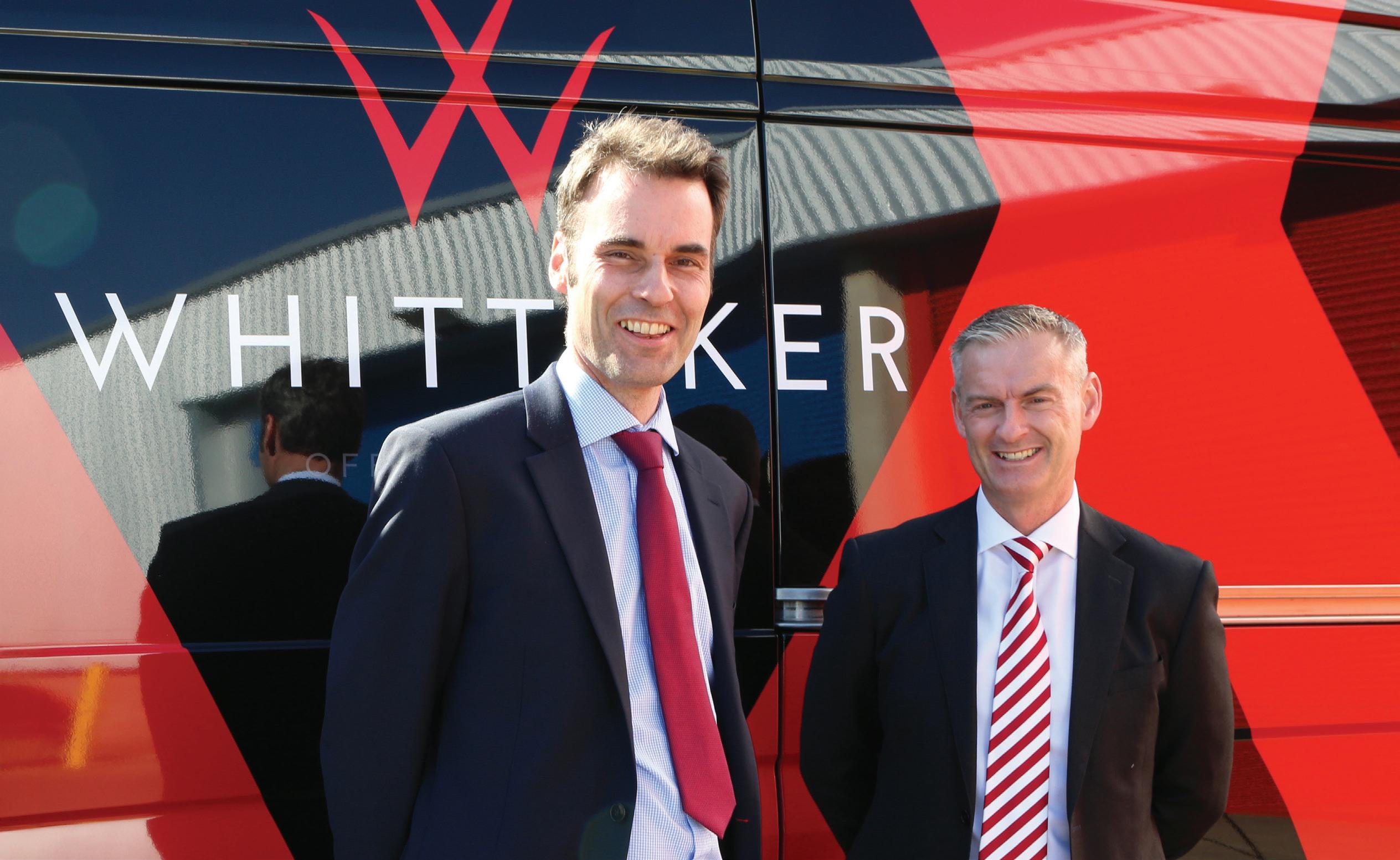
Whittaker Workplace Solutions has forged a distinctive niche, charting a deeply rooted entrepreneurial path that positions the company to establish a lasting industry legacy
Whittaker Workplace Solutions was founded in October 1983 by Kelvin and Lynette Whittaker during a period of entrepreneurial encouragement under Margaret Thatcher’s administration, which aimed to bolster small businesses as a cornerstone of the UK economy. Located in Loughborough, strategically positioned between Nottingham, Derby, and Leicester, Whittakers has grown from its humble beginnings into a robust second-generation family business.
Nick Whittaker, Managing Director and son of the founders, fondly recalls his early involvement in the business. From the age of ten, he was engaged in various activities, from distributing leaflets around the industrial estate to stamping the Whittaker logo on
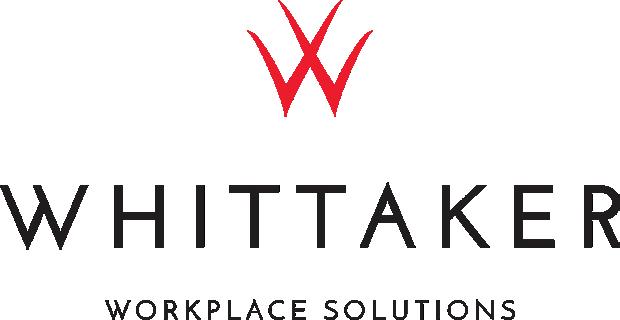
promotional literature. “I remember using the Progress System from Interactive Products from a young age, so there wasn’t a lot I didn’t know about it. Then it was sold to ECI and we transitioned to the Blue Sky, Horizon system – only for it to be sold to ECI,” reflects Whittaker.
His hands-on experience laid a strong foundation for his future leadership role in the company. Upon Kelvin’s retirement in April 2007, Nick, along with Sales Director Martyn Hammond and a small management team, have been steering the ship ever since.
Today, the company operates with a lean yet efficient team of 28 employees, including part-timers. This small but dynamic team thrives in a hands-on culture where multitasking is the norm. Whittaker emphasises the importance of a unified team effort, likening their
NO. OF EMPLOYEES
18 NO. OF UNITY DEALERS
approach to the Ronseal ethos of ‘doing exactly what it says on the tin’.
Pre-COVID, Whittaker acknowledges that the dealer was considerably larger and experienced a decline in turnover of around 15-18% during the pandemic. However, by 2023, the company had rebounded to a turnover of £5.1 million, and today, the run rate exceeds £8 million – thanks in part to the company’s Unity dealer services division.
“We are quite fortunate that one of our most successful verticals is primary care, so during COVID our goods and services were still needed,” shares Whittaker. However, he admits that while the company has been fortunate to post a profit every year, the past few have been “particularly challenging”.
Initially focused on traditional office supplies, the company has expanded its product portfolio to include workwear, PPE, print materials, business gifts and workspace solutions and fit-outs.
This strategic diversification has been key to its resilience, finding success not only in primary care but also in the education sector, particularly higher and further education. Despite not being on framework agreements, which, according to Whittaker, have barriers that are seemingly impossible to break down, the dealer has carved out a niche in serving small to medium businesses.
While office products remain the core of the business, Whittaker says the easiest wins have been in corporate clothing and PPE: “Opening the door with this product sector has enabled us to branch out and deliver more of our goods and services to those customers.”
The foray into the workwear market began serendipitously when a salesperson responded: “Yes, we can do that” to a long-standing customer’s inquiry about clothing, despite not having a supplier or even a catalogue. Within a month, Whittakers had found the necessary solutions, and today, that same customer is the company’s biggest clothing buyer.
Whittakers has distinguished itself in the workwear market by offering superior service levels, often surpassing those of larger corporate suppliers. States Whittaker: “It’s been relatively straightforward to gain accounts on our service offering and price is secondary in this scenario. Clothing today represents north of 20% of our total turnover, excluding Unity-related sales.”
The company collaborates with multiple clothing wholesalers to ensure a comprehensive range of sizes and styles are always available. Additionally, close partnerships are maintained with local embroiderers to
provide high-quality personalised garments. While other dealers have brought embroidery and printing in-house, Whittaker has taken a more cautious approach: “This is a growing sector for us but, we’ve not seen the value in bringing embroidery in-house to date,” he says.
A focus on service quality over price has been instrumental in winning and retaining customers. According to Hammond, leading with workwear in sales strategies and reversing back into office supplies and other products has frequently proven effective, providing a softer entry point to potential customers. “One of our biggest clients took a leap of faith through a formal tender process and replaced one of the large corporate clothing companies with us, and they’ve never looked back. They think it’s an amazing transition regarding service levels,” he adds.
Over its 41-year history, Whittakers has built strong ties with wholesalers to ensure consistent service and supply for its customers. For the first 20 years, the dealer was aligned with Spicers but has since been with VOW. “We’ve moved wholesalers once, as I believe it’s about building relationships and working in partnership,” notes Whittaker. The same approach applies to dealer group affiliations. Starting with Basicnet, which evolved into OfficeSmart, Whittakers joined Integra Business Solutions in 2005.
One of our biggest clients took a leap of faith […] with us, and they’ve never looked back
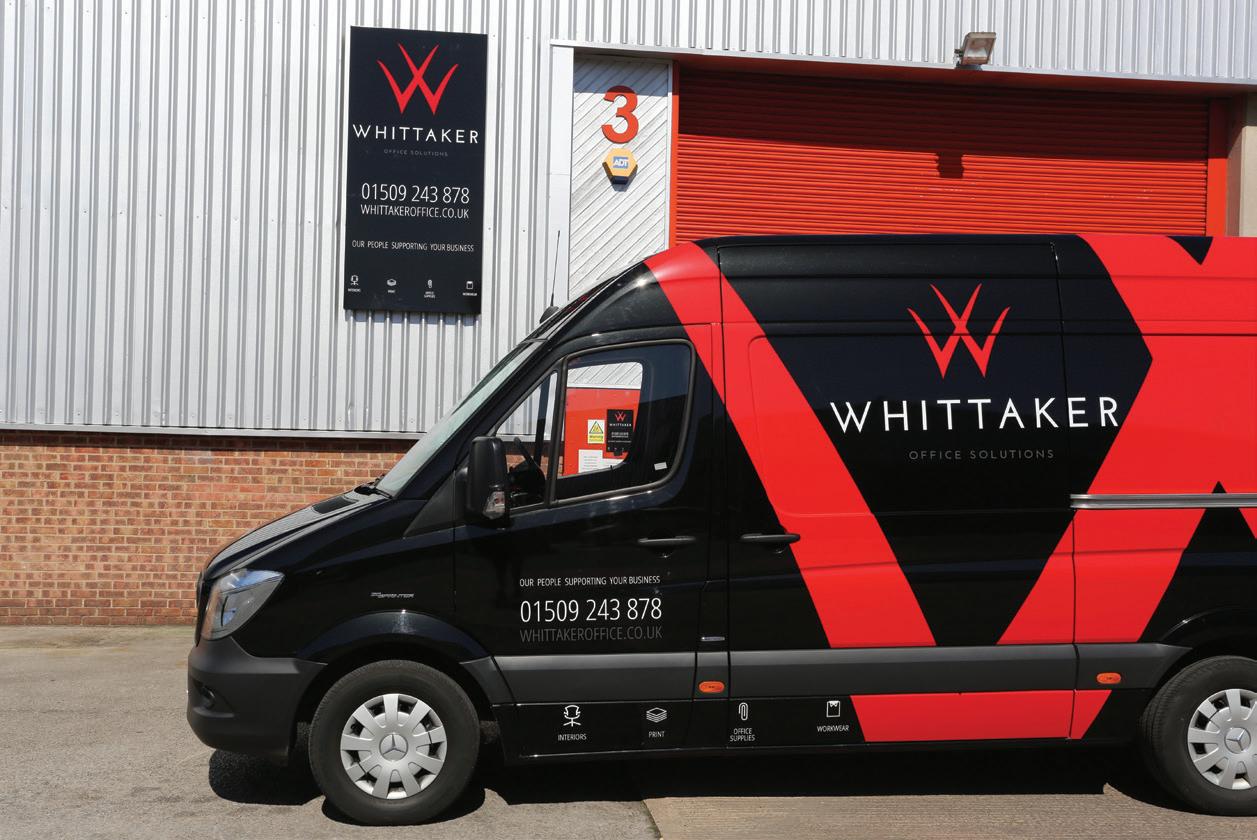
In the company’s early days, such networks provided essential support, which was crucial for the young business, according to Whittaker. Today, he highlights the value of Integra’s Initiative brand which has been particularly beneficial, offering a third string to their bow, especially when other products were out of stock.
Hammond says that Whittakers’ focus is more national than many other dealers and relies heavily on VOW for its comprehensive service proposition. This approach enables it to serve a broader geographic area effectively. However, it also means competing against resellers such as Lyreco, Viking and Complete to a certain extent.
Amazon also factors in the picture, mainly due to its influence on pricing strategies in the industry by making them more transparent. Despite this, Hammond is keen to point out that the online giant has not become the threat it could have been. “Our clients have remained loyal, even in terms of the longtail. Of course, I’d be foolish to say that Amazon hasn’t taken a slice of the action, but we were early adopters of fair market pricing which has played out well with our customers.”
Whittakers has transitioned from Horizon to EvolutionXGEN for its webstore needs, which allows the management of multiple stores and provides flexibility, particularly for accommodating the Unity side of the business. Hammond explains: “For the Unity division, it’s almost a dual B2B/B2C model. While managed centrally, each member has a bespoke webstore. Some require customers to open an account, whereas others offer the ability to buy on a credit card.”
The demise of Nectere was certainly an injection in our arm
The introduction of the Unity dealer service group division has been a significant milestone for Whittakers, but contrary to popular belief, Unity was not an opportunistic reaction to Nectere’s difficulties. Its origins date back to pre-pandemic times when a dissatisfied Nectere dealer approached Whittakers for help managing the business. This initial encounter laid the foundation for Unity.
The core framework was established early on and viewed as a promising concept worthy of further development. Operating initially in stealth mode, the team focused on refining the model and selectively engaging potential partners. Positive feedback from early adopters led to organic growth as dealers recommended Unity within their network. According to Whittaker, the phrase “dropping a little honey in people’s ears” aptly described their approach, particularly targeting Nectere dealers as a natural audience.
The turning point came around Christmas last year when Nectere’s stability faltered, prompting a surge of interest in Unity. Over a short period, Unity successfully onboarded approximately 11 new dealers, bringing the current total to 18. “The demise of Nectere was certainly an injection in our arm and welcomed from a
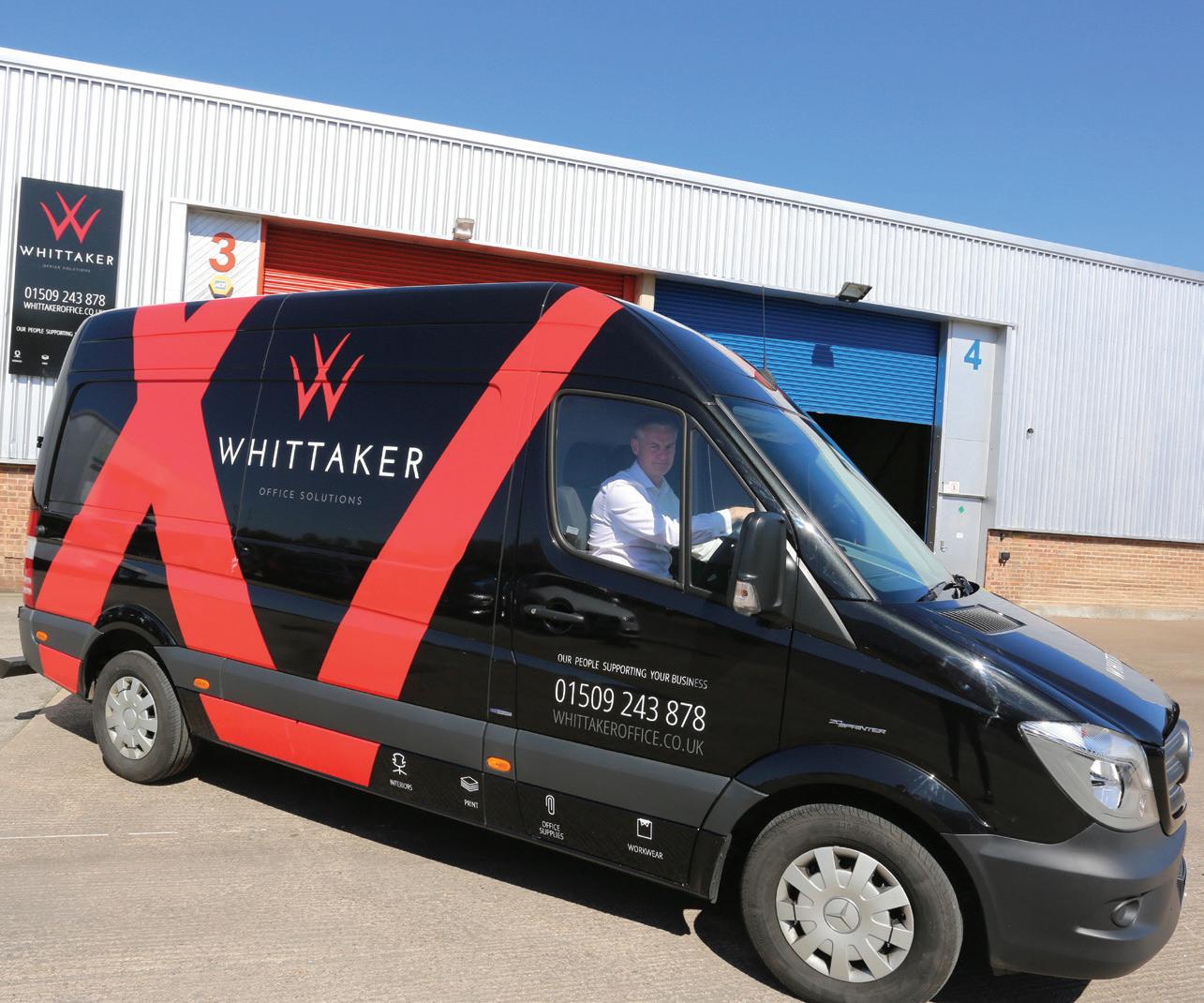
sales perspective, if not necessarily from an industry one and the hardship many dealers went through,” admits Whittaker.
However, it wasn’t all plain sailing. Managing both Whittakers and Unity posed operational challenges but strategic use of phone systems and marketing tools ensured clear delineation between the two entities to prevent confusion.
“I think we’ve taken the best bits of Nectere, provided exceptionally high service levels and treated dealers according to their unique wants and needs. Our ability to run Unity and Whittakers side-by-side is due to the clever systems we’ve adopted and our amazing team, which we’re very fortunate to have,” says Hammond.
As for the future, Unity’s growth trajectory is expected to stabilise. While Hammond points to the scalability of the business model, Whittaker is keen to grow Unity with new members but has no current desire for it to become the size and scale of Nectere.
He adds: “Have we hung a number on where we think is a sensible place to draw the line? No. We’d be silly to do so because there will be businesses where Unity is a stepping stone, and they will eventually want to go off and do their own thing. But there’ll be others that are happy letting the Unity team carry on.”
Looking ahead, Whittaker believes sustainability represents a particularly daunting prospect in navigating the complex and evolving landscape of environmental regulations. Although not yet heavily involved in large business contracts, he anticipates these regulations will eventually impact smaller businesses. In the meantime, the dealer is taking proactive steps such as implementing LED lighting, using green energy suppliers, promoting cycling to work, incorporating electric vehicles and working on its Scope 3 emissions targets.
Despite these challenges, 2024 is shaping up to be a promising year for Whittakers. January marked a record month in the company’s history, and there is optimism about continued growth. “Some might say I’ve been overcautious, but I’m still here to tell the tale and focused on ensuring we remain fit for purpose and financially strong,” says Whittaker.

Post-it Brand celebrates 20 years of Super Sticky Notes

In a fast-evolving world where efficiency and reliability are paramount, Post-it Super Sticky Notes have been a steadfast fixture in workplaces and homes. This year, as the brand celebrates the 20th anniversary of its super sticky adhesive, constant innovation has kept these Post-it notes relevant and indispensable.
Twenty years ago, 3M recognised and swiftly adapted to a shift in how people handled sticky notes. Originally, Post-it Notes were used primarily for jotting down reminders and quick memos and stuck to other pieces of paper or on telephones or desks. However,
As a brand leader, 3M understands the current economic challenges and has teamed up with VOW and Exertis Supplies to offer up to 50% off bulk purchases of Post-it Super Sticky Notes. The aim is to provide cost savings without compromising on quality, ensuring customers can still enjoy the best products even when budgets are
behaviours changed and sticky notes were brought into play for brainstorming and stuck to vertical surfaces such as monitors and walls.
To accommodate these new demands, 3M introduced the super sticky adhesive, specifically designed for harder-to-stick surfaces, with twice the sticking power of traditional Post-It Notes.
“3M has innovated continuously since launching the super sticky formula,” explains Simon Williams, North Europe Shopper Marketing Lead, 3M UK. “Our goal has always been to set the benchmark performance level
tight. Says Williams: “Branded products typically offer better quality and superior features than cheaper or generic items in the same category. These value packs ensure customers can benefit from cost-savings without dealers having to down-sell and risk their reputation by selling inferior products.”


The robust super sticky adhesive ensures that notes stay put, even on these challenging surfaces. Says Williams: “In a home setting, employees prefer good-quality branded products. They are less priceconscious and more focused on buying products that perform well. The volume of usage may be lower, but the need for consistency and quality is even more critical.”
Eight Super Sticky Notes collections are available, all featuring different product colours, lined versions and 15 size variations, helping users to tailor the aesthetics of their working environment to suit their personality.
Making it even easier for Post-it Brand lovers to work from anywhere, 3M has fully embraced the digital age with the launch of the Post-it App. The app allows users to capture and digitise up to 200 individual square Post-it Notes at a time, making it easy to integrate handwritten ideas into digital workflows. It can convert notes into PowerPoint, Excel, Trello, PDF, Dropbox, Teams and email formats, ensuring seamless sharing and collaboration.
20 years on, Post-it Super Sticky Notes have remained the top choice for those customers who need reliability
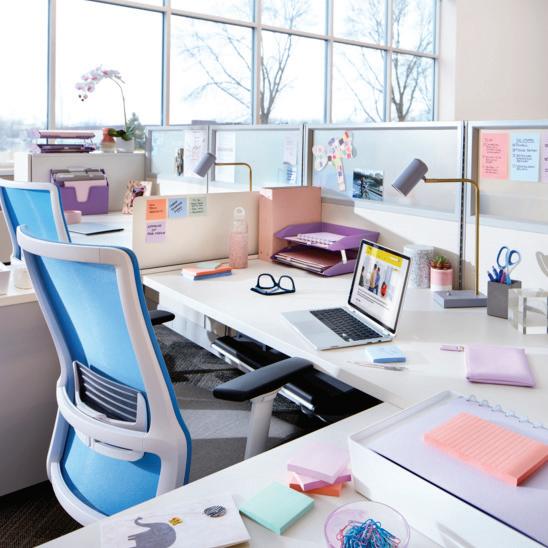
in the market. Despite the commoditisation of the category and the influx of lower-cost private labels, 20 years on, Post-it Super Sticky Notes have remained the top choice for those customers who need reliability.”
The post-pandemic shift to hybrid working environments has further demonstrated the importance of quality sticky notes. At home, people are more likely to place them on unconventional surfaces such as fridges, walls and even windows.
Although the Post-it Brand remains a flagship product, 3M’s portfolio extends far beyond sticky notes. The company is also a leader in PPE, hygiene, jan/san, privacy products and picture hanging solutions, through its Command brand. “While Post-it Notes is our most visible brand and the one we’re best known for, we are
In 2023, 3M launched Post-it Super Sticky 100% Recycled Notes made from 100% PEFC Recycled certified paper and plant-based inks and dyes. 3M’s environmental commitment means that for the past eight years, 60% of its innovative super sticky glue has been derived from a renewable resource – a plant that regrows annually.
Attention is now firmly focused on packaging, with around 80% of the Post-it Super Sticky Note range already plastic-free and a goal to eliminate plastic by mid-2025. In addition, all Post-it paper products are recyclable as the adhesive is ‘washed away’ during the deinking process.
As 3M celebrates two decades of super sticky innovation, it remains committed to quality, sustainability and meeting the evolving needs of consumers – wherever they are.
Whether it’s kicking ideas around at work, scribbling down messages at home or digitising concepts, Postit Super Sticky Notes continue to offer unparalleled reliability and performance.
witnessing big growth in our non-stationery markets. This means 3M is well placed to serve the business supplies industry for the next 20 years,” says Williams.

From a crumbling balance sheet to strategic reinvention, Ryman CEO Theo Paphitis unveils his strategy for revitalising a high street icon. Talking candidly with Workplace360 CEO Steve Hilleard, he shares his vision for preserving the company’s legacy while rebooting a retail revival
Workplace360: Your background is well documented but remind us of when you acquired Ryman. Theo Paphitis: It was 1995, but Ryman itself is 130 years old.
W360: You must feel quite a sense of responsibility.
TP: Well, that was one of my opening lines when I resumed responsibility as Chief Executive because COVID decimated our balance sheet and cash flow.
People underestimate the longevity issues the pandemic caused small retail businesses.
When I stepped in, I said, “This business is 130 years old and I’ll be damned if it’s going bust under my tenure. So, we’re going to get our shit together and decide how to reinvent ourselves and get back into profitability.”
Our primary sources of income through the business stores, as I call them (as opposed to consumer stores located mainly in CBDs), disappeared because people were working from home two or three days a week. The rent remained unchanged as landlords were unwilling to reduce it. With lower income, once the rates were reintroduced, it meant only one thing: losses. So, regaining profitability was my main aim.
W360: You stepped back in about a year and a half ago, correct?
TP: Yes, it was October 2022. I don’t think it could have happened any other way. I don’t want to detract from the efforts of the previous management team, but it would have been nearly impossible for them to do what I’ve done and can do. It may sound arrogant and negative towards them, but I will qualify that.
It wasn’t due to their lack of ability; they simply couldn’t make the instant, on-the-hoof decisions that I could. They’d have to go through a whole raft of management procedures and eventually make a decision, which they might not be able to make if it involved spending more money. They’d have to come to me and the board to justify and explain their decisions. I think it was impossible for them.
W360: Is the decision-making process easier now?
TP: Oh, listen: the decision-making process is incredibly simple. Nothing should take longer than three working days. Since I don’t have to consult anybody or have a board meeting, if I screw up, it’s on me.
W360: Let’s discuss your most recent financials –quite a turnaround.
TP: The key highlight is that we’ve returned to profitability. Also, we’ve been able to pay back the first tranches of the CBILS loans we had to take out during the pandemic to stay afloat. But the biggest achievement is not what is in those accounts.
Far more significant is understanding our reason to exist as a business. We’ve just talked about Ryman’s long history, but how many other heritage brands have disappeared from our high streets?
W360: Dozens in my lifetime.
TP: Exactly – and it’s not all down to bad management, contrary to reports in the popular press. Many of these brands lost their reason to exist. Perhaps someone could have reinvented them.
W360: Do you genuinely believe that? I’m trying to think of a notable example of a business that has been radically reinvented.
TP: That’s a good challenge. While businesses can be reinvented, some are just too difficult and too large. I made a sweeping statement and you’re right to pull me up on it.
I’m good at making sweeping statements but also very good at recognising exceptions to the rule. I’ll say department stores – it’s hard to reinvent those.
This business is 130 years old and I’ll be damned if it’s going bust under my tenure
W360: OK, we’ll leave it at some.
TP: We need to be sure we have a reason to exist. When I bought Ryman nearly 30 years ago, I was told I was buying a dog and that the age of the stationery store was done and dusted. The paperless office was coming and we had 80 stores. Now we have nearly 200 stores and continue to open new ones.
W360: Well, come on then: what is the reason to exist now? What have you told your team?
TP: Interestingly, my team were looking for great words of wisdom and a light bulb moment from me. Instead, I asked them all to give me a reason why we should exist, why this building should exist, why the brand should exist and why they should exist. I pointed out that I could easily sell or close the
business, sell the properties, put my feet up and not spend two days a week in Crewe.
W360: What were the reasons?
TP: I had my own ideas, but they were largely influenced by the past and the 20 years when I actively ran the business. That’s dangerous because the world moves on. While I own the company and attend board meetings, I also have interests in other businesses. I didn’t know the intricate details and it was up to me to learn them.
Understanding the business in general didn’t take me long. But was I confident that all my ideas were viable, deliverable and profitable? In all truth, no. I think anyone who says they have no self-doubt is not being honest. It was crucial to get buy-in and ideas from what was left of the tier-two management. We recruited a new team and, most importantly, went on a journey to discover why someone would visit a Ryman store.
We concluded that our customers trust us. We saw this firsthand when people came into our store and donated thousands of pounds for good causes without asking why, like when we were raising money for Ukraine. It shows the trust of local communities
What we’re doing now is putting our bum in the bacon slicer
because, in many areas, we’ve been there all their life. It’s not a bad base to start with.
However, our primary customer base is ageing. If all our customers die, I’m dead. So how do we get ourselves fit for the next 130 years? We need to attract the next generation and therefore go more ‘consumer’ as far as our stores are concerned.
A big driver – and it is as clear as the nose on your face – is hybrid working. Those working from home don’t want a plain black or grey notebook, filing cabinet or desk. They want attractive products in their home.
People are more relaxed, which is a great opportunity for us to be unstuffy and more customer- and consumer-friendly and appeal to younger generations.
We began by adding more craft items, so when parents take their kids home from school, they can pop into a Ryman store, spend £5 and find educational-type projects to keep them busy. We want the kids to be able to come in and find stuff that’s not just educational but fun and fashionable.
One of our big successes is the Legami stationery brand. We’ve also been amazingly successful with the uni-ball Posca range, which is more artistic and fun and something we wouldn’t have stocked previously. We sold more traditional markers.
Now, with the recent launch of the greeting card app, we’re using technology to drive footfall back into our stores.


W360: Some of those initiatives are still quite recent and might not yet be reflected in the numbers.
TP: True – the app is very new and we haven’t had a proper launch yet. It’s an amazing tool, with two more releases planned, which I’m excited about. By September, it will feature all the services we want, including printing.
For instance, if you have a thesis to print, you can download the app on your phone, send the document and pick it up within 60 minutes in one of our 200 stores. If you need it bound, no problem. It is an important part of our business.
W360: It sounds similar to many services the Staples stores used to offer.
TP: We actually bought a lot of Staples’ equipment when it closed down. Our printing services, week on week, are our most profitable SKU now. Over the past 12 months, we’ve invested significantly in the greeting cards, the printing app and our website.
W360: You obviously have a finite footprint in a store. What had to give way to make space for these new additions?
TP: It’s so blindingly obvious it stares you right in the face. As a serious business stationer, I could give you ten different staplers and hole punches. But does a customer need that many? Those who want something more specialist can pay for it there and then and have it delivered free of charge the next day.
W360: So, SKU rationalisation.
TP: Very much so. We’ve had to re-evaluate every SKU and category without devaluing our specialist stature. Sometimes, the team suggested removing slow-moving items but my response was that we need to keep those products because no one else stocks them. When a customer wants it, they want it. You have to make those calls.
W360: You have a B2B business and a very nice online presence, but your efforts have clearly been directed towards retail…
TP: I’m a shopkeeper and it’s the first thing I had to fix. Without that, the rest wouldn’t have a reason to exist. They rely on the brand name in the high street and the reflected glory from our hardworking colleagues in the retail stores.
Once I got that sorted, I focused on the app to drive people back into the stores. Now, my next exciting journey is the Ryman online business – not the B2B side, as I don’t see the priorities and the wins there as much as I see them in the next stage of the development of Ryman and the website.
It’s a great website and we’re adding a new click and collect module soon. We’ve launched a rewards scheme and the data that gives us to understand our customers better is amazing.
W360: OK, let’s delve into B2C then.
TP: The new website’s great because I’m constantly
evolving it. Previously, we used a third-party provider, but the greeting cards, loyalty scheme and printing can be done via the app and the website. I expect our printing business to double over the next year from what it is today.
W360: How important is it right now?
TP: It’s our most profitable category and it’s brilliant not relying on a third-party brand. I’m relying on my colleagues and the Ryman brand to deliver a service. It’s all within our grasp to improve it or cock it up.
W360: Are there other products and services coming down the pipeline?
TP: There’s a whole raft of things. I’ve already mentioned we’re revolutionising click and collect, which goes live with Robert Dyas in July. Ryman goes live shortly after that, which will change the way we operate. In the coming months, the aim is to utilise our 200 stores as hubs, so whether it’s a lastminute gift or a forgotten occasion, we can deliver to customers within the hour.
W360: Like some Uber-type tie-up?
TP: It’s tailored for urbanised areas where our stores are located. The new systems have been tested and they work.
W360: Are bolt-ons such as flowers, chocolate, champagne etc a logical extension as well?
TP: Watch this space. By way of example, a reminder calendar will be launched in a few months, allowing customers to buy gifts instantly.
W360: What does the competitive landscape look like for you online?
TP: Online is interesting for stationery; it’s tough because of the average price of the product. Our online presence has been remapped and we’re in the second phase of reinventing the Ryman website. Numerous proof-of-concept tests are yielding promising results.
You know, the easiest person in the world to fool is yourself. We can say what we want about our brands and actually believe it. Whether it’s true or not is another matter. What we’re doing now is putting our bum in the bacon slicer.
W360: We don’t have enough pages for all these pull quotes!
TP: (Laughs) And only I could do that. Could you imagine another CEO saying to the Chairman of the business: “I’m going to do this, and the consequences of failure could be disastrous because we’re going to discover the emperor has no clothes on.”
By the way, I’m confident that the emperor is clothed and the brand has the value and the recognition to carry off what I plan to do.
W360: Every online retail chief exec I’ve ever spoken to has said the biggest issue – apart from dealing
with large competitors like Amazon – is the cost of customer acquisition.
TP: Of course it is. And it’s the re-cost of acquisition. Customers are promiscuous, with a whole raft of other people trying to drag them to different websites. Mr Google sells you a customer. You pay Mr Google and the following day he’s back on that customer trying to send them to your competitor and he gets paid again. That is why we started the loyalty scheme: so we can sell to customers directly, with the benefit of what I would have paid Mr Google.
W360: Without wishing to sound rude, why did it take so long?
TP: Well, it bloody well did! I mean, I can’t do everything. I had managers, but they didn’t do it. It was one of my frustrations: there was always a reason why it didn’t happen. Going back to what I said earlier, I’ve put my bum in the bacon slicer. So, here we are – the loyalty scheme is up and running, the app is live and the new Ryman Design store concept has launched.
W360: Is Ryman Design filling the gap left by the demise of Paperchase?
TP: It’s filling the gap for anybody who wants design-led stationery. We opened a fourth store in Edinburgh in May; another follows soon in Cheapside in London, with another planned in South London. We’re going to try to get to ten by year-end.
W360: Do you have a rough idea of what the country could tolerate?
TP: I’d say around 30 more.
W360: That seems less ambitious than what one might expect from you.
TP: I’ll tell you why. I’m realistic and I want them all to make money. I could open more for the sake of having more stores and you might argue, “Theo, you’ve got to get the economies of scale and the minimum order quantities.” Call me unambitious, but if you give me another 30 profitable stores…
W360: I think I’m the last person to accuse you of lacking ambition.
TP: That’s fine, I don’t mind. Maybe it will make me focus on it. I’ll certainly be thinking about that now.
W360: Before we shift gears, let’s touch on Amazon. Is it a level playing field?
TP: No. It’s not. The playing field is anything but level. It’s comical. Successive lazy governments have failed to do what’s right for the country, both for the fabric of the communities we serve and financially. Anybody who put their shoulder to the wheel could generate a lot more income for the Treasury if people were taxed equally, but they aren’t.
We all know that big online tech companies don’t pay their fair share. There are companies importing products, avoiding VAT and rates and giving nothing to the Exchequer but taking a big slug of the retail cake.
We’ve got to evolve and have a reason to exist […] It might just take some redefining
How can that be right? If I were in charge, it wouldn’t bloody happen.
W360: I’m not going into politics, but you’re one of dozens of big brands on the average British high street. Why isn’t there more collaboration through retail consortiums or other entities?
TP: Because they give you lip service. Bless the British Retail Consortium (BRC): Helen [Dickinson, CEO] does her best, but the BRC – which represents a wider tranche of retail (not just physical) – has to toe the line. Recently, it has been more vocal. I used to criticise it for being too polite, but it is never going to get the politicians over the line. Sometimes you need to back them into a corner; they don’t react any other way and just fob you off and move on.
W360: Have you ever been tempted to venture into politics?
TP: Don’t be ridiculous. I’m too old and far too opinionated. Worse than that, when I do a job, I like to do it properly. Restructuring business rates is complicated and won’t get them many votes. It will get them my vote, though.
W360: Independent retail stationers face some of the same issues you do. How confident are you of their future?
TP: Quite honestly, I don’t know their situation well enough. I believe there’s a future for the stationery industry. If we look at some back-to-school products, for example, they’re not particularly Ryman-type products, but it’s what’s in the store. We’ve got to evolve and have a reason to exist, and they will have a reason to exist. It might just take some redefining.
W360: I recall you trialled some dual-brand stores – Robert Dyas and Ryman. Are they still around?
TP: There are eight. They’re really good and all make me good money.
W360: You’ve got a big smile talking about them.
TP: I’ll tell you why. It all started as another point of frustration for me – one that I nearly fell out with management over. We had a store in Bexleyheath that was coming to the end of its lease; we’d been there 100 years or so but weren’t making any money. We had a Robert Dyas store opposite that was twice the size it needed to be.
We thought we had a deal with the landlord to renew the lease under new terms, but he played hardball, assuming we had no other options. He was

wrong. I just moved across the road, rebranded as Robert Dyas Ryman and refitted the store.
W360: It sounds like more of a “fuck you” statement than a strategy!
TP: It was a “fuck you” statement but also part of a strategy that had been in my mind since I bought Robert Dyas. When you have stores opposite each other, it makes sense to streamline operations with common deliveries, till systems, back-office systems, alarm systems, etc.
Initially, the management team suggested creating a new brand. I disagreed. We kept the Robert Dyas brand intact, simply adding a Ryman sign. The store layout was straightforward: 1,000 sq ft for Ryman on the right and 2,500 sq ft for Robert Dyas on the left, with a shared entrance in the middle.
The familiar red and green branding might jar a little, but it’s what made it so interesting and the store went straight into profitability. When we’ve had the end of leases and could do so, we’ve done the same and turned marginally profitable shops into really profitable ones.
It’s been great and I’ll be doing more. Is there a plan to do 100? No. Can I see another half a dozen in the next 12 months? More than likely. And if I find a store in a good market town which is big enough to take both of them, I’ll open them.
W360: Shifting to B2B: given Ryman’s strong brand, trust and reputation, I’m surprised you’re not bigger in the B2B space. Do you feel any frustration about that side not keeping pace?
TP: (Pauses) Frustration isn’t quite the right word. Disappointing isn’t either. Let’s consider the barriers to entry. Twenty years ago, e-commerce was really in its infancy.
If you wanted a stationery chain, you’d have to open at least 40 stores – a big cost: warehouse, trucks, distribution centres, infrastructure, tills. It created a substantial barrier to entry.
This wasn’t the case in the B2B sector, which is why you have so many independent B2B resellers – good family businesses in a nice town, often operating from a small shop or even a shed, with a van for deliveries.
W360: And they don’t even need a van.
TP: Lots of them do local deliveries. So you are competing with good, solid local businesses run by the owners, which is always a wonderful thing.
W360: As you’re finding.
TP: Absolutely. I love small businesses and have loads of them in my Small Business Sunday network. They’re brilliant. Every time I meet with them, there’s so much energy that I bounce out of those gettogethers like a spring chicken.
You are competing with good, solid local businesses run by the owners, which is always a wonderful thing

Then you had the big corporates going for the big clients. It was all about volume, with really tight margins and a lot of hairy-arsed salesmen – as they used to call them. This is not the way I portray my business or myself. It’s not my ethos. So we were never really going to compete with them.
Then we saw – I’ll pick one that’s been in the news recently – Euroffice, which came out of nowhere and did amazingly well because it used technology instead of hairy-arsed salesmen. It didn’t have stores, could cut margins, not worry about the pricing in stores, etc. But it was hard for us to copy or imitate them because of our retail portfolio.
You’ve got to stick to what you’re good at. We have a fledgling B2B business, but frankly, it’s not my priority. It just ticks along, doesn’t make any money but doesn’t lose any either. There might be opportunities for growth in the future, potentially through partnerships with someone who can dedicate the necessary focus while maintaining the integrity of our brand.
W360: Before we wrap up, I want to ask about sustainability. What are Ryman’s credentials and what are you doing as an organisation?
You’ve got to stick to what you’re good at. We have a fledgling B2B business, but frankly, it’s not my priority
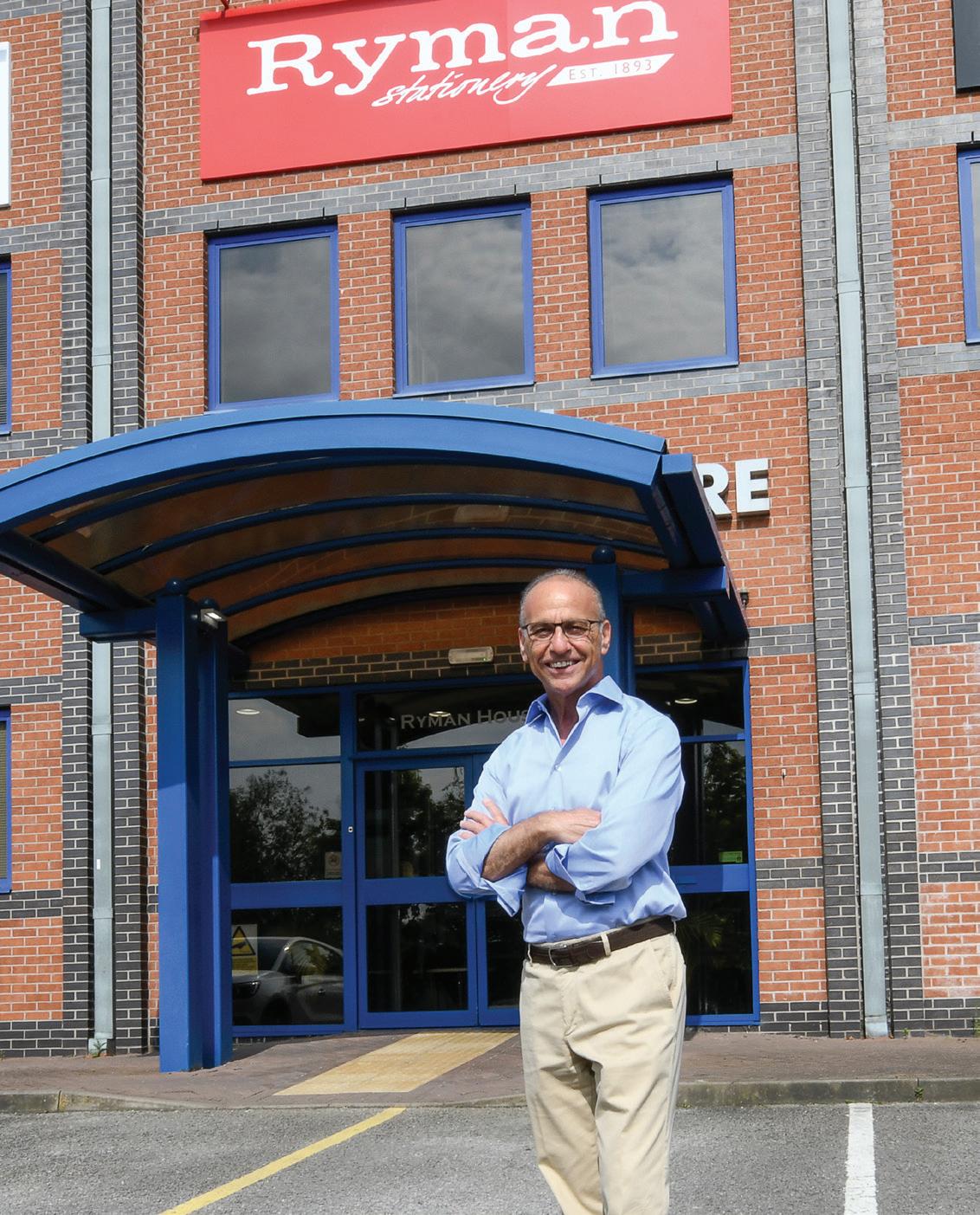
TP: I was a bit ahead of my time on this, which is rare. I did a fantastic video around 13 years ago about accounting for sustainability in your business. I got Deborah Meaden and Justin King involved, Lord Stuart Rose, Sir Richard Branson and Indra Nooyi, who was CEO of PepsiCo at the time. We got then-Prince Charles involved as well through the Prince’s Charities.
It’s a hilarious skit and you can still find it on YouTube [Ed’s note: Search for Business Leader or Eco Warrior, or the Accounting for Sustainability (A4S) channel.] I’ve always been very much along the lines of, “We’re all interconnected and I don’t want to leave my children a world that is not fit for the future.”
There are so many things we all can do. Installing solar panels on your warehouse roof. The payback for LED lighting is within 12 months for a business. Almost every company car we have is now electric. Why wouldn’t you do these? But we only do things when it hits the bottom line.
It’s dead simple, but there has to be a lead. I’m not talking about government subsidies for businesses; I’m talking about creating an environment where sustainable practices are the norm. Unfortunately, governments have been very poor at providing that leadership.
W360: Last question. You’re going to be 65 this year. What are your plans for the immediate future?
TP: Well, clearly, I’m over the hill now.
W360: Yes, well over.
TP: (Laughs) I’m no longer a young whippersnapper. I felt terrible at the London Stationery Show because I was like a national treasure! I mean, stop it. Being at the twilight end of my career is quite frightening, but as long as I’ve got the energy and enjoy what I do, I’ll keep doing it.
W360: So you’ll be hands-on at Ryman for a little while longer?
TP: Not too long. I’ve got other interests in retail as well.
W360: A lot of knickers to sell.
TP: A lot of knickers to sell, a lot of hardware to sell, plus other investments.
W360: What’s your succession plan? When Mrs P finally says: “OK Theo, we’re going to spend more time in Spain and you’re going to stop work.”
TP: People stop working to do what they enjoy but this isn’t work for me. At some stage, the management team will take over. As I said when we started this interview, the most effective way to achieve transformation is with the business owner involved – making those quick decisions with the right information and avoiding corporate paralysis.
If you’re the owner, the buck stops with you. When I believe we’ve got enough projects on the right path, then I’ll step back.
W360: Well, it’s good to see you gainfully employed at last. Thanks, Theo.
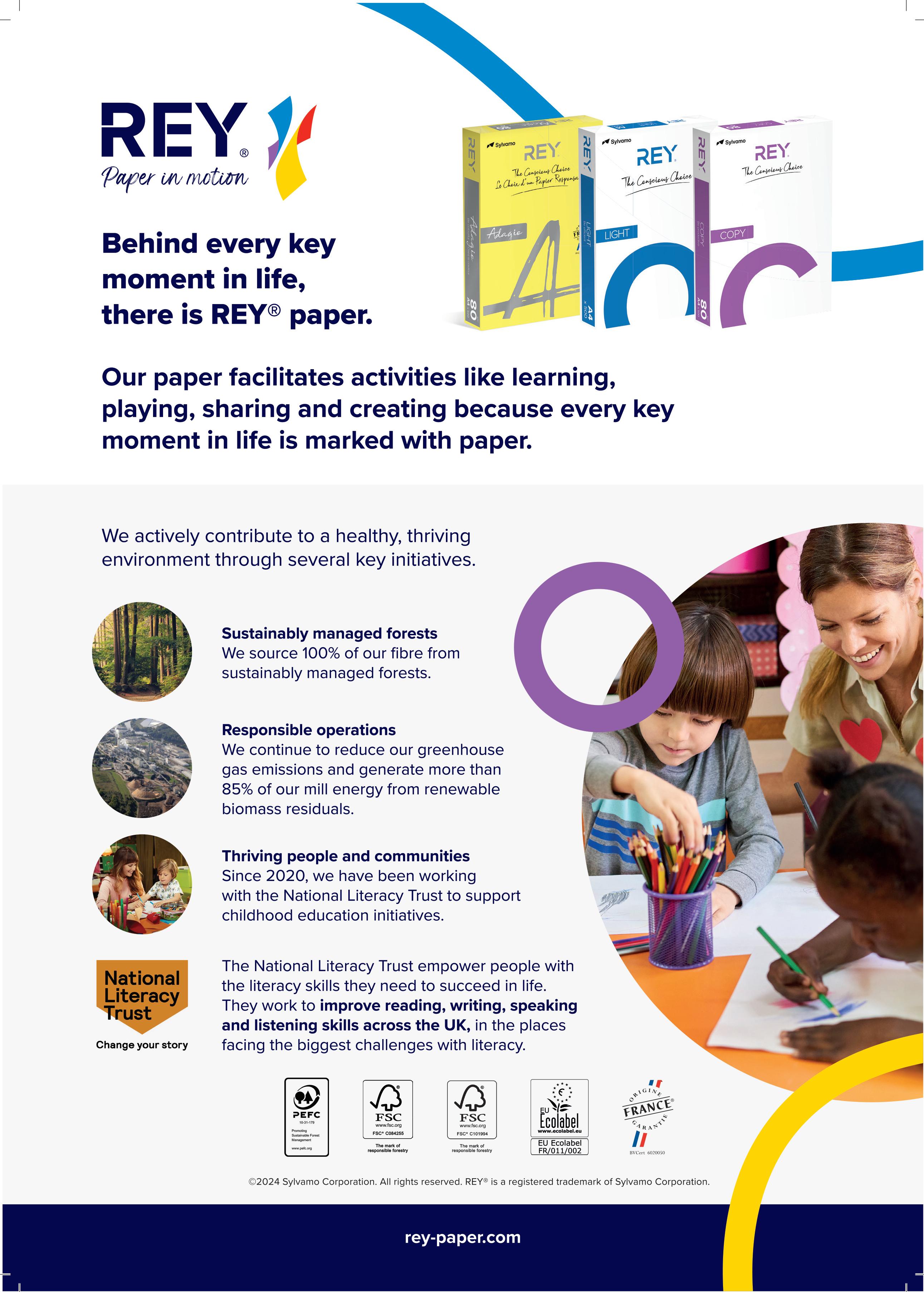
On 6 June, the British Independent Retailers Association (BIRA) announced the biggest class action lawsuit ever launched by UK retailers, as it filed a £1 billion damages claim against Amazon with the Competition Appeal Tribunal (CAT).
The accusation? That the online giant has been illegally using retailers’ data and manipulating the Amazon Buy Box to benefit its own commercial operations, revenues and profits.
More specifically, BIRA claims that, between October 2015 and mid-2023, Amazon used data belonging to UK retailers – data which is “non-public and belongs solely and specifically to the retailers” – in combination with manipulating the Amazon Buy Box, to engage in a product entry strategy that resulted in sales revenue and profits being diverted from these retailers to Amazon.
A £1 billion damages claim filed against Amazon by UK retailers is being hailed as a “landmark collective action”
“The retailers, many of which are small independent UK businesses, were unaware that Amazon was illegally using their data to benefit its own retail operation,” stated BIRA.
The organisation continued: “Amazon was already charging them a non-negotiable 30% commission on every product sold on the site. By misusing their proprietary data to bring to market rival products that are sold cheaper, Amazon is effectively pushing many of the UK’s independent retailers out of the market.
“The consequences of Amazon’s abusive conduct has been to inflate its profits and harm the UK retail sector, especially the smaller independent retailers that are struggling at a time of difficult economic circumstances.”
NOT AMAZON’S FIRST RODEO
Of course, this is not the first time Amazon’s use of third-party data has been in the spotlight. It has faced – and continues to face – scrutiny from competition authorities in the US and the EU. Meanwhile, in the UK, a 2022 probe by the Competition and Markets Authority (CMA) alleged Amazon was abusing its market position and giving an unfair advantage to its own retail business and retailers that used its services.
This resulted in a 2023 commitment by Amazon to make changes to its marketplace rules in the UK. These included: not using commercially sensitive third-party data to help it make product and pricing decisions for its

first-party business; and guaranteeing a level playing field for products featured in the Buy Box.
On 3 November 2023, following a consultation period, the CMA agreed to Amazon’s proposals. Earlier this year, Germany-based Alcis Advisers was confirmed as the Monitoring Trustee charged with ensuring Amazon is complying with its commitments. Alcis is also carrying out a similar role in Europe following an agreement between the e-tailer and the European Commission.
“We’ll continue to ensure that the criteria used to determine the Featured Offer are non-discriminatory and treat sellers and Amazon retail equally,” Amazon UK confirmed in a note on its Seller Central platform.
One UK seller writing on the platform claimed it can “prove” Amazon is not meeting the above commitment, but at least there is now an external monitor to where complaints can be addressed.
The CMA deal has not deterred BIRA from pursuing legal action against Amazon. On the contrary, the trade association said the agreement had enabled Amazon to “avoid a full investigation and detailed decision from the CMA about its conduct”.
According to BIRA CEO Andrew Goodacre: “The British public has a strong relationship with its local, independent retailers and ensuring they are not put out of business by Amazon’s illegal actions is a key driving force behind this collective action.”
He added: “One might ask why an independent retailer would use Amazon if it is so damaging to its business. In reality, we have seen a significant shift in consumer buying behaviour and, if small businesses want to sell online, Amazon is the dominant marketplace in the UK.
“While the retailers knew about the large commissions charged by Amazon, they did not know about the added risk of their trading data being used by Amazon to take sales away from them.”
Predictably, Amazon described BIRA’s accusations as “baseless”, saying: “Over 100,000 SMBs in the UK sell on Amazon’s store, more than half of all physical product sales on our UK store are from independent selling partners, and the fact is we only succeed when the businesses we work with succeed.”
BIRA CEO Andrew
Goodacre

One might ask why an independent retailer would use Amazon if it is so damaging to its business
At the Amazon Business ABX event in London on 20 June, Fabricio Pedroza, Country Manager of Amazon Business UK&I, was unaware that BIRA had filed a complaint. Speaking to Workplace360’s sister publication OPI, he called the development of its marketplace concept one of the company’s “biggest innovations” in the past 25 years and echoed the corporate PR line about Amazon’s vested interest in seeing third-party sellers succeed.
BIRA predicts a certification hearing before the CAT to allow its complaint to proceed will take place before the end of the year. The association believes a trial could happen sometime in 2026 or Amazon might propose a “fair and reasonable” settlement before then – although neither of those scenarios is guaranteed.
In the meantime, the class action suit has put small retailers and resellers competing against Amazon in the spotlight. They should be leveraging this with customers which value doing business with local companies.
In addition to BIRA, Professor Andreas Stephan, a competition law scholar and Head of the University of East Anglia Law School, has filed a third-party seller damages action suit against Amazon. Working with Geradin Partners and litigation funding firm Innsworth, Stephan believes the final claim will be in excess of £2.5 billion. “Amazon has engaged in a variety of strategies to grow its e-commerce platform, lock sellers into it, prevent the expansion of rivals, and use that privileged position to exploit sellers that use its platform,” he stated.
The emergence of this second claim against Amazon is not necessarily good news for BIRA, as its own legal action may now be delayed as a result.
Print volumes continue to decline, forcing the MPS, print and imaging industry to adapt. By David Holes
It’s no secret that the print and imaging market is under strain, primarily due to the shift towards digital document management, with further pressure added due to post-pandemic hybrid working practices.
A recent report – Future of Document Capture, by research organisation Quocirca – highlights the trends and expectations in the industry. The study reveals that companies anticipate an average 3% reduction in print volumes over the next year. This decline is expected to be even more pronounced among SMEs, with a projected 6% decrease, and public sector organisations, with a 9% reduction. Moreover, 75% of businesses are accelerating their transition to digital alternatives and 11% already operate in a fully paperless environment.
Static Control Components (Europe) Business Development Manager Lisa Hainsworth notes that budgetary belt-tightening is leading companies to refresh their printer fleets less frequently, posing challenges for OEM manufacturers in introducing new machines to the market. She adds that the shift towards MPS solutions is exacerbating this issue.
The potential cost savings of switching to MPS is a big incentive, according to Brother UK General Manager Sales, Services & Solutions Greig Millar. According to Millar, a typical large business could save £16,500 over three years compared to buying printers and supplies on a transactional basis.
This switch to managed print offers substantial growth potential for dealers, particularly those involved in the SME market, agrees Chris Bates, Director for Print & Supplies at UK IT distributor TD SYNNEX. However, he stresses the need for simplicity in service offerings: “For most customers, the combination of on-site warranty, active monitoring of devices and advanced warning of the need to refill or replace ink will be enough – and this is the kind of service every print partner should be looking to provide now.”
Quocirca CEO Louella Fernandes does not doubt that the industry focus will continue to move away from pure hardware solutions towards more advanced and integrated information management systems. She explains that print hardware is just one component of the complex information management challenge facing most organisations.
Increasingly, devices are becoming closely integrated into document workflow systems, making it crucial for suppliers to understand the potential of supporting platforms and software. Fernandes adds: “MFPs now act as an on-ramp for digitising paper documents that then undergo OCR analysis, with subsequent automated actions based on the contents. Our research found scan volumes are expected to rise by an average of 6% in 2024, pointing to a growing opportunity around document capture hardware and software as part of MPS provision.”
Céline Berson, Category Product Manager EMEA at Altkin (formerly Armor Print Solutions), highlights the development of services associated with printing – such as maintenance and consumables delivery – as key

AI’s growing influence is undeniable
growth areas for SMEs. She adds that the company is seeing strong growth in the document management system (DMS) market, driven in part by new EU laws and regulations that necessitate the digitisation and secure storage of records.
Berson states: “The printing market is undergoing significant changes and players must adapt to new trends to remain competitive. Developing value-added services such as DMS and on-demand printing solutions is a key element for future growth.”
Steve Pearce, Head of Marketing at Kyocera Group UK, acknowledges that while print remains relevant for the foreseeable future, manufacturers and resellers must offer products and services that enhance efficiency and security and introduce technological advances beneficial to their customers. He says cloud-based printing solutions are gaining significant traction, allowing employees to print and scan securely at any time while reducing the need for physical infrastructure.
He continues: “Kyocera Cloud Print and Scan empowers agile workplaces via secure print release and integration with third-party storage solutions such as OneDrive, SharePoint, Google Drive, Box, etc. It’s perfect for hybrid offices that require zero infrastructure on-site. Furthermore, users are increasingly demanding these systems are underpinned by tangible CSR benefits, with services and contracts offering demonstrable carbon neutrality and sustainability programmes.”
Quocirca’s AI Adoption Study 2024 reveals that for 78% of businesses, AI is a top area of focus, with vendors building features into their portfolio of products and services. Examples include predictive device maintenance and customer support tools, together with AI-powered security solutions and intelligent document processing.
Several experts that Workplace360 contacted confirm this trend, noting that AI is already revolutionising the sector and rapidly becoming a driving force for innovation and efficiency.

According to Berson, AI and machine learning (ML) are transforming the MPS market by analysing printing data to identify inefficiencies and suggest solutions. She explains that these technologies can also put printers into sleep mode to save energy when not in use. In parallel, ML predicts printing needs and ensures the supply of consumables, guaranteeing printer availability.
We could be on the brink of a transformation of the workplace, says Pearce, with AI simplifying routine tasks and making challenging projects more achievable: “AI’s growing influence is undeniable. It will form part of the changing landscape of our professional lives and is already helping businesses become more productive.
“For instance, AI is now embedded in our products, such as the TASKalfa series, which uses the technology to enhance low-resolution print data and smooth pixelated images, as well as analysing handwritten notes in documents.
“In addition, AI-driven digital automation has enabled users to free up valuable time by eliminating repetitive tasks such as data entry. Now, a document can quickly be scanned and the data extracted with minimal human intervention. This simple yet powerful tool reduces both turnaround time and human errors.”
Other emerging innovations include the launch of five-colour photocopying technology in laser printers.
Fujifilm Business Innovation has launched its Apeos A3 multifunction printers in the UK market. Despite being a dominant player in Asia, Fujifilm had minimal representation in the office MFP market in other regions following the end of its joint venture with Xerox in 2021.
Gary Organ is spearheading the sales push in the UK as Head of Device Technology at Fujifilm. After a long career at Canon, he says he jumped at the chance to grow a business from scratch but states that Fujifilm is not a ‘new entrant’ in the market: “We’ve been established for more than 60 years and our technology already exists in Asia-Pacific, where we are the number one A3 player.”
Taku Ueno, SVP, Device Technology Division at Fujifilm Europe, said the company had enjoyed “huge success” in Europe since its entry into the toner production printer business in 2021. He called the launch of the firm’s office printers the “natural next step”. In the UK, well-known local managed services provider Aurora has been appointed as the sole reseller. This has been done to test processes, procedures and the market reaction to the Fujifilm offering.
Over the next three years, the goal is to achieve a balance of nationwide, regional and local partners via – to begin with, at least – a channel-only approach. The distribution of supplies is being managed by Westcoast. Organ adds that a major focus will be establishing relationships based on “honesty, integrity and trust”. He believes Aurora recognises the benefits of – and is even surprised by – Fujifilm’s technology. “We knew we were going to shake the market up a little, but we may disrupt it more than people originally imagined,” he says.
Haybrooke CEO John Roche explains the differences between printing-as-a-service (PaaS) and MPS. PaaS is akin to a subscription model for printing, where you pay for services on demand. Think of it as a cloud-based approach to printing, similar to how you subscribe to software services such as Microsoft 365 or Adobe Creative Cloud.
PaaS providers offer a range of solutions, from basic document printing to more specialised services such as large-format printing or promotional materials. PaaS offers:
• Flexibility: It allows users to scale their printing needs up or down based on demand. They are not tied to specific hardware or infrastructure.
• Cost-efficiency: Pay only for what you use, avoiding upfront capital expenses.
• Centralised management: PaaS streamlines print management by providing a unified platform for all printing requirements.
• Cloud integration: PaaS leverages cloud technology, making it accessible from anywhere with an internet connection.
MPS, conversely, is a comprehensive solution which goes beyond individual print jobs to augment an organisation’s entire print fleet, including printers, copiers and scanners. The goal is efficient, cost-effective and secure printing across the business.
A client best suited to MPS could, for instance, be a large corporation with multiple offices. The service then ensures consistent print policies, monitors usage and optimises the entire print environment. When a printer malfunctions, a technician promptly resolves the issue, minimising disruption. The key benefits of MPS are:
• Proactive maintenance: MPS providers handle all day-to-day maintenance, ensuring printers are always fully operational.
• Supply management: Toner, parts and repairs are included, minimising downtime.
• Efficiency: MPS organises print fleets strategically to improve workflow and reduce waste.
• Security: The technology sets access controls, tracks usage and enhances document security.

This is disrupting the traditional four-colour model by expanding the visible spectrum that can be printed, thereby enhancing document vibrancy. Additionally, the rise of wide-format, label and packaging printers is opening up new opportunities for dealers, while advancements in consumables are delivering better quality, greater durability and lower costs.
These developments are enabling the exploration of markets such as textile printing and the production of wallpaper and wall decorations. Furthermore, specialised inks and novel direct to film techniques are being employed to print on a wider range of different substrates and previously difficult materials.
Sustainability [...] will shift business models from linear to circular, leaving industry dinosaurs that can’t adapt to become extinct
Quocirca’s Print Sustainability Trends study shows that 77% of organisations are accelerating their sustainability plans, with 85% believing this will be an extremely important factor in business performance by 2025. These companies are seeking suppliers that can support their environmental strategy, with 46% stating their decisions are influenced by their goals in this area.
Says Fernandes: “The factors most important to companies when choosing print products are sustainable ink or toner, energy efficiency and product longevity. 79% of organisations are also willing to pay more for a printer or MFP if it contains recycled materials.”
David Connett, founder of the European Toner & Inkjet Remanufacturers Association (ETIRA), says sustainability is a key driver in Europe and will shift business models away from linear to circular, leaving industry dinosaurs that can’t adapt to become extinct. In the UK, plenty of options are available for dealers to purchase remanufactured toner and cartridges, including from operators such as The Jolly Savage, CTS Wholesale, Data Direct and DCI.
The latter, for example, has recently expanded its offering through its recycling and refurnishing collection arm, The Recycling Factory (TRF), with the introduction of refurbished printers and copiers. TRF is looking to address the growing demand for ecofriendly products through its tailored collection and buy-back programmes. In addition, internal and external packaging for the recycled printers is FSC-certified and recyclable, with all recycling procedures conducted under one roof and products delivered directly from its UK production facility.
Static Control’s Hainsworth notes that while sustainability was once considered a luxury, it is now a non-negotiable requirement across the whole channel.
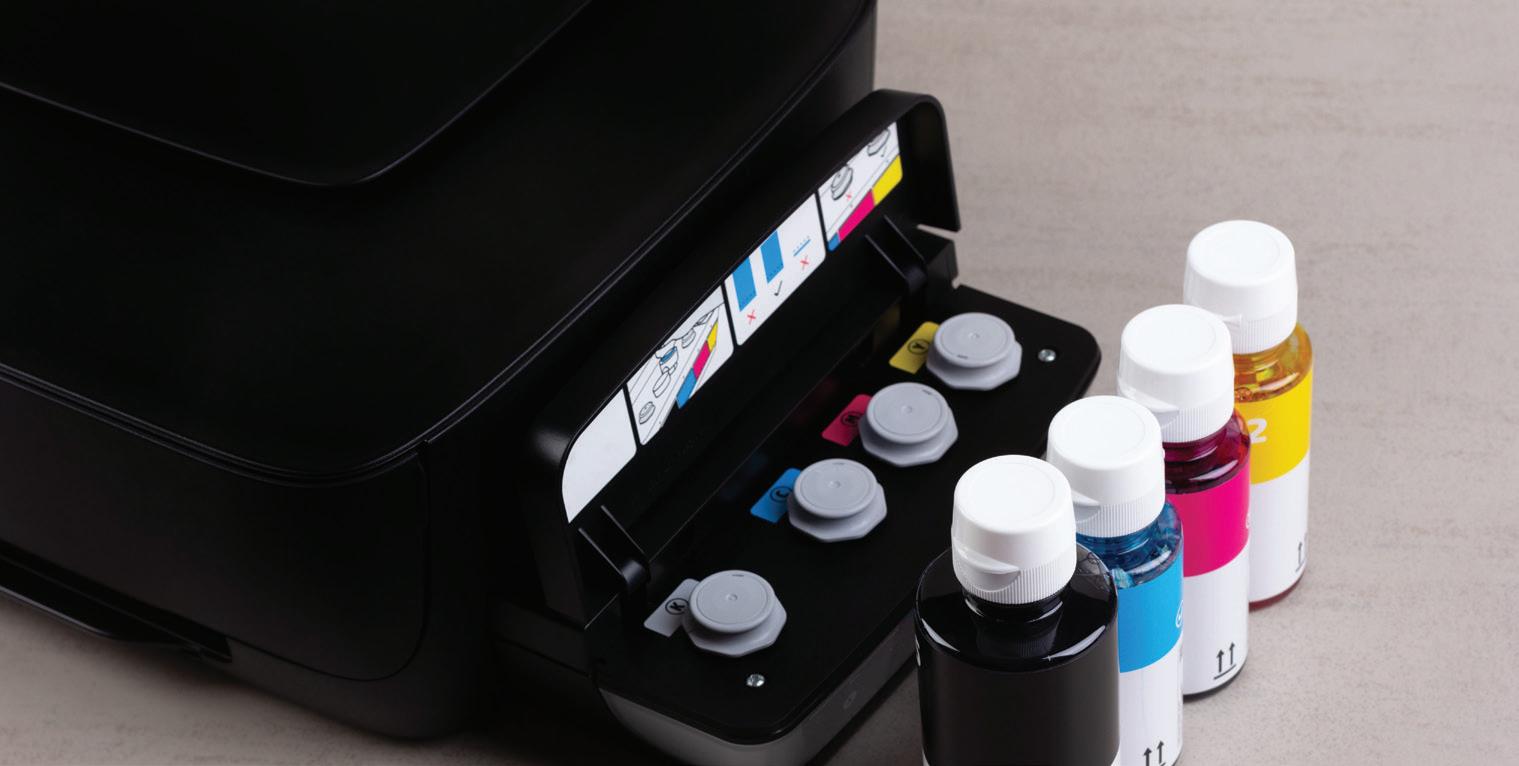
She states: “Static Control’s entire proposition is now designed to reduce environmental impact. From reusing OEM toner shells and using plastic-free packaging to providing numerous collection services, we work hard to achieve the required standard.
“Customers constantly ask for more sustainable options. This drive is also resulting in hardware remaining in use for longer, as clients realise their devices, despite being a few years old, may have only completed 10% of their working life.”
There are many initiatives underway to promote sustainability within the industry. For instance, Dan Wogan, Product Manager at Epson UK, highlights the company’s adoption of heat-free technology in its inkjet printers as a significant step forward. This technology eliminates the need for heat in the ink-ejection process,

resulting in reduced power consumption and energy savings. Moreover, it puts less strain on serviceable parts, leading to longer product lifespans compared to traditional laser printers.
Wogan further explains that Epson is responding to customer demand for more sustainable solutions by transitioning from traditional ink cartridges to ecofriendly refillable tanks: “Remarkably, just one set of ink bottles is equivalent to 72 cartridges, highlighting the huge reduction in plastic waste that’s possible.”
Kyocera UK achieved an environmental milestone in 2022 by reaching net zero emissions, surpassing the original target set by its parent corporation by 28 years. According to Pearce, it was the first UK vendor to ensure that every ECOSYS and TASKalfa printing product in its range is carbon neutral.
Kyocera UK also partners with PrintReleaf to reforest all the paper used in its operations and
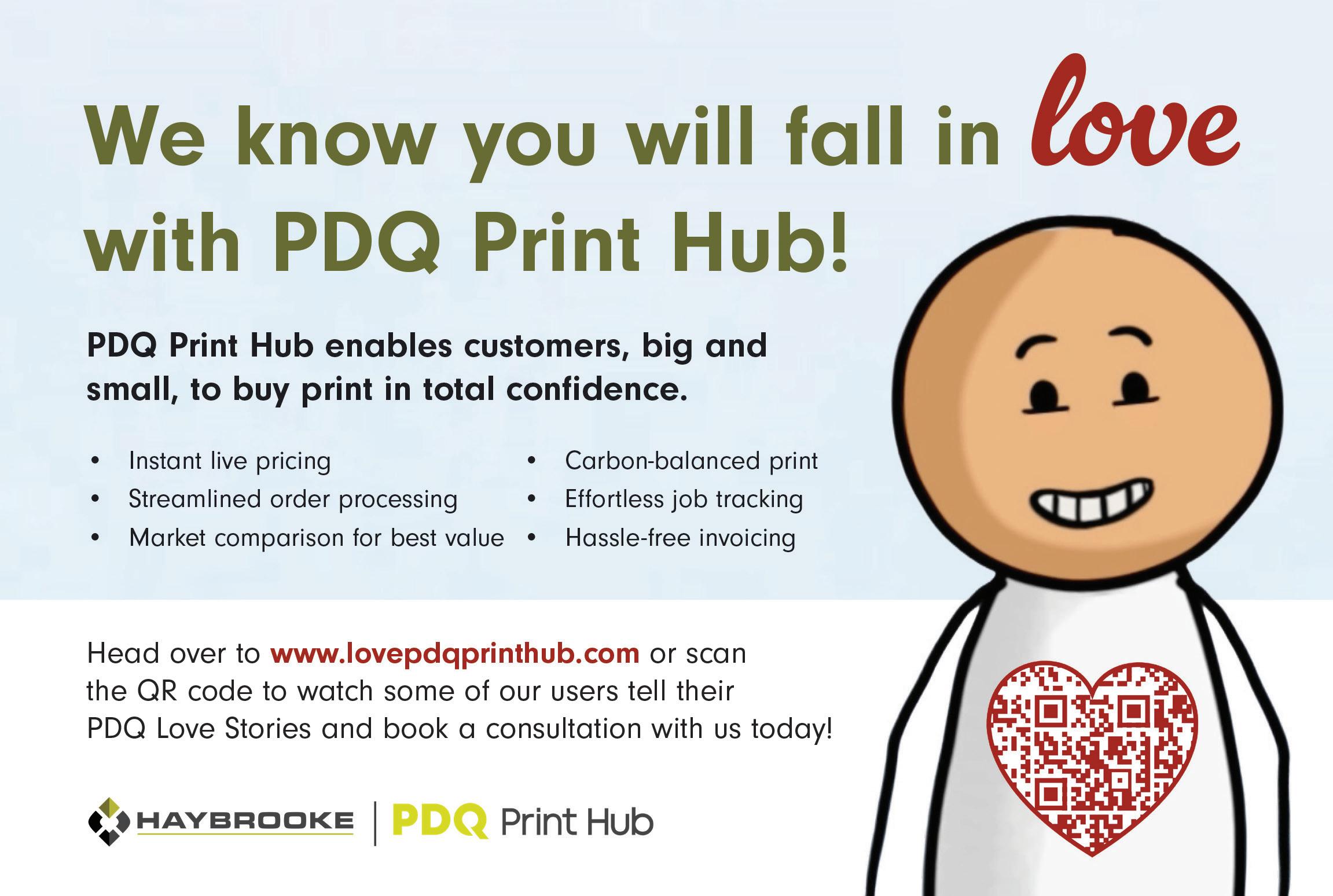
extends this initiative to its production print customers by replanting trees equivalent to every page printed on TASKalfa Pro printers sold.
In addition to its reforestation efforts, Kyocera ensures sustainability by making its toner cartridges 100% recyclable. Partnering with a UK toner recycling company with a zero waste to landfill commitment, Kyocera ensures that once cartridges are empty, they are ground into recyclate used to make new products, including street furniture.
Bates reports that TD SYNNEX switched to using 100% renewable power at all its UK locations last year while also reducing its energy consumption by 25%. He remarks: “We are getting close to achieving net zero on Scopes 1 and 2 and working with courier and vendor partners on Scope 3. We are also running a three-day course for partners – the Net Zero Academy – which will equip them to conduct their own carbon assessment and formulate a reduction plan.”
In a notable achievement last year, Brother UK became the first company to be awarded the Blue Angel certification for one of its remanufactured toner cartridges, boasting a composition of over 75% reused parts. Says Millar: “Sustainability will continue to shape the print landscape in the years ahead, with customers looking to vendors and resellers to help them cut emissions and waste.
“Customers can already return their toner or inkjet cartridges to us free of charge to be remanufactured. We’re also making carbon-saving data available to our MPS customers, which is valuable for their own
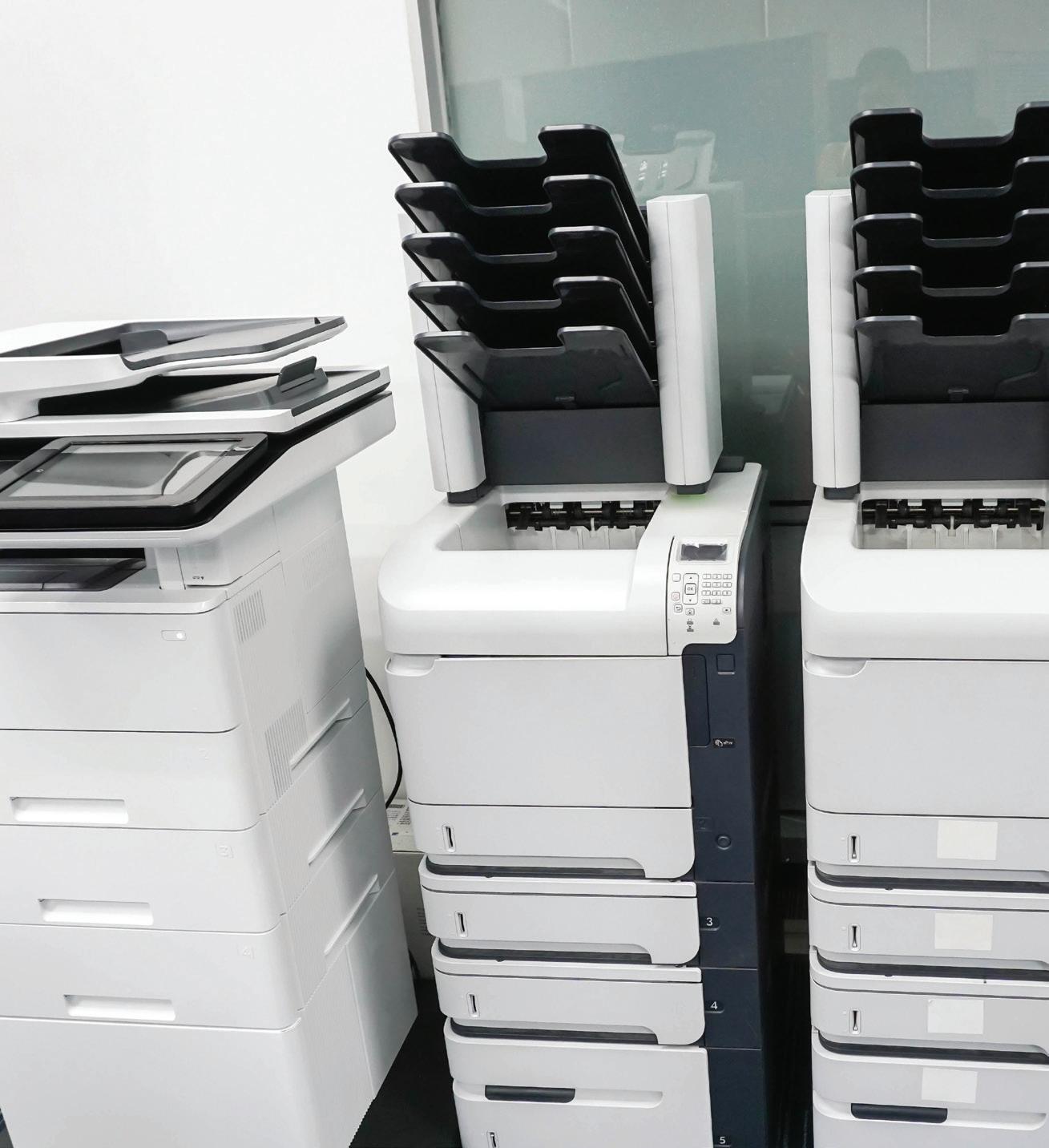
sustainability reporting. In total, they save 5,300 tonnes of CO2 every year by remanufacturing toner cartridges with Brother UK.”
The print industry is experiencing rapid change as it attempts to counter significant headwinds. But in these turbulent times, where are the profits for dealers operating in the category?
Specialists consulted by Workplace360 consistently emphasised a core point: the importance of offering customers the agility needed to navigate this challenging economic environment. Dealers that can deliver not only agility but also security assurance and support in achieving environmental goals stand to gain.
Distributors must also adapt their business models, with diversification and a broad range of products and solutions becoming ever-more vital, according to Exertis Supplies Director of Commercial Print Ben Appleby.
ETIRA’s Connett delivers the clear message that independent dealers need to transform their sales pitch, ditch the traditional hardware spiel and become sustainability champions. “It’s time to shift gears and show customers the real goldmine – substantial savings through sustainable solutions. Sure, it’s a bold move that might ruffle some OEM feathers, but the future belongs to the brave. Lead with eco-innovation and the rewards will follow.”
Sustainability will continue to shape the print landscape in the years ahead
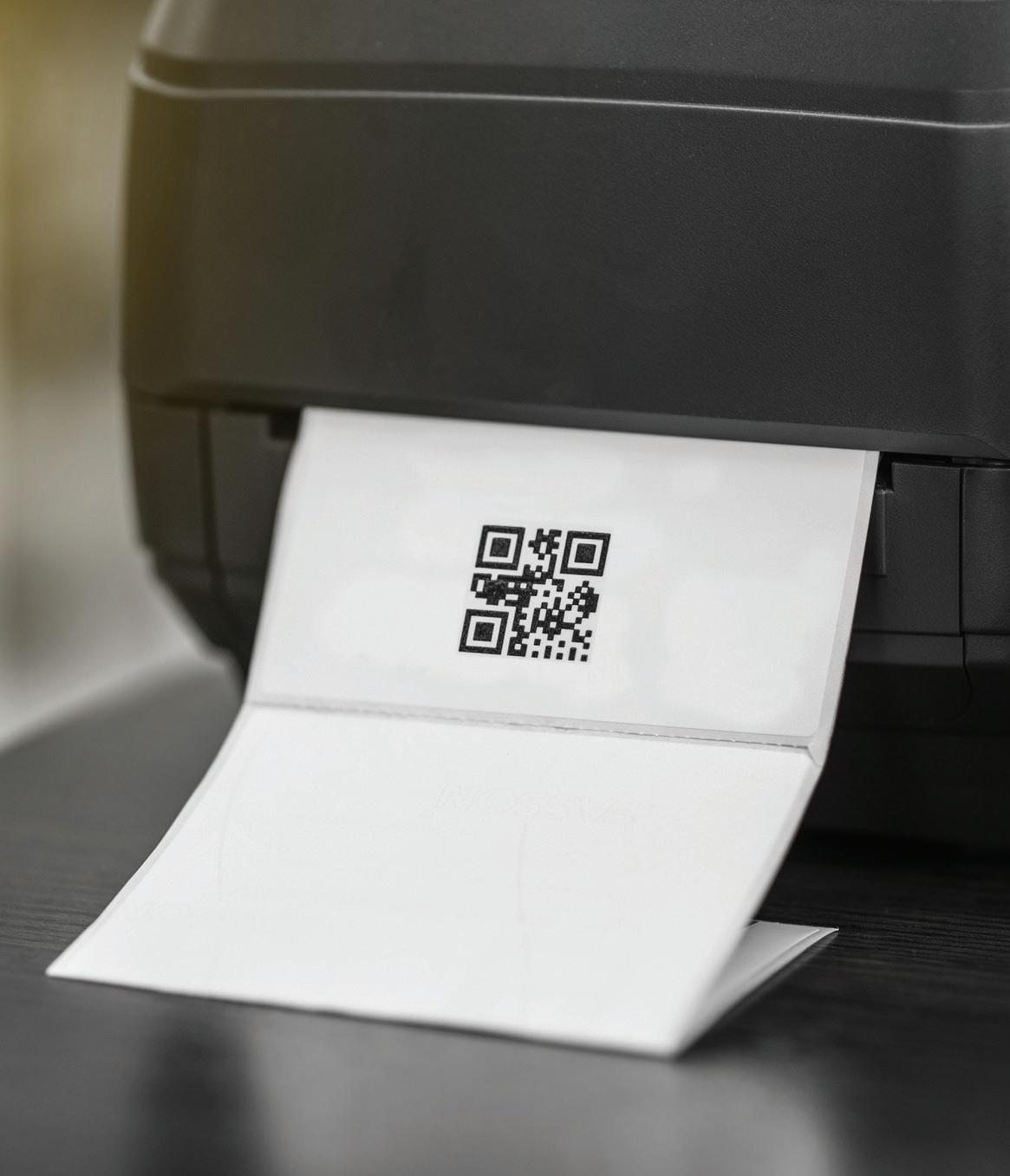

Times really have changed in our industry. It is hardly necessary to point out that COVID and the commercial Armageddon that followed were merely nasty accelerating agents in an already challenged sector. We were already in trouble from attacks through a whole raft of technological developments and the flood of online competitors led by the biggest tsunami of all: Amazon.
As independent dealers emerged from the national lockdowns – bloodied and bruised but still alive – the pre-existing issues were still present. And that core, traditional market – well, it got smaller still.
It is time for a new strategy – one that accepts these changes are real and permanent. One that recalibrates our thinking, positively changes our expectations and mood and embraces the unique benefits that dealers possess in their ability to adapt and evolve to seize opportunities.
This article is the first instalment in a four-part series aimed at identifying the fundamentals of creating a

new future. Before I get into the bones of this initial discussion on strategy, it’s important to highlight that TSP’s contribution to this debate is built on a foundation of both successes and failures in driving diversification in our respective businesses and shared experiences. We’ve had some planned wins, stumbled upon surprise successes, hit the occasional road bump and, of course, faced one or two abject failures – all accompanied by a healthy degree of trial and error.
These articles will have a decent sprinkling of realism and it will come as no surprise to learn that there is no clear-cut way of achieving the endgame you seek (or think you seek).
What is strategy?
I’ll start with the term itself: strategy. In business, ‘strategy’ is a word used frequently, often out of context and, if we are honest, rarely given the time or execution it deserves by the dealer community. However, in the everchanging landscape of the workplace supplies reseller
market, a compelling and innovative strategy is crucial to give your company a chance to win business, sell at the prices you want and grow profitably to survive and prosper. Perhaps more so now than ever before.
The first natural advantage of a good strategy arises because most businesses in our industry don’t have one, and your competitors don’t expect your company to have one either! Simply having a strategy puts you at an advantage straight away.
Many common strategies are based on outdated assumptions that businesses today have the same choices and purchasing behaviours as they did in the 1990s. This assumes that customers need dealers to help them navigate the process of sourcing and purchasing products backed by a range of service options, with the dealer being the only company capable of providing this.
True: for a long time, dealers had a significant advantage – the good old days! – with the knowledge and supply chain relationships to give customers access to all the products they needed. Additionally, they could advise on sourcing all the products outside of the core. But, as we know, a business today doesn’t need a dealer to help with purchasing.
One great yet simple example of this worrying change is when a start-up opens its first office. In the past, these companies would turn to the Yellow Pages (yes, I’ve been doing this for a long time) to find a business supplies reseller and call them. The rep would arrive and sell desks, office stationery, paper, etc. This initial interaction would likely lead to another order, some repeat business and, voilà – you’ve got yourself a customer, possibly for five years or more. If they grow, you grow. Lovely. Rinse and repeat.
Simply having a strategy puts you at an advantage straight away
By comparison, a start-up owner nowadays takes great pleasure in preparing a new office by shopping on the internet for everything and at no point thinks they need anyone to actually help. All this stuff can be bought from anywhere, can’t it? The upshot is the company never engages with a dealer and takes advantage of all that wonderful knowledge and advice at their fingertips. This presents a serious challenge: how do dealers become wanted and valued again?
And that’s just for new customers. What about existing clients? Let’s be honest, resellers have done an amazing job for customers over the years – achieving such a broad standard offering of thousands of products, available from multiple sources with pretty much the same levels of service. This makes it relatively easy for a customer to change suppliers if they really want to.
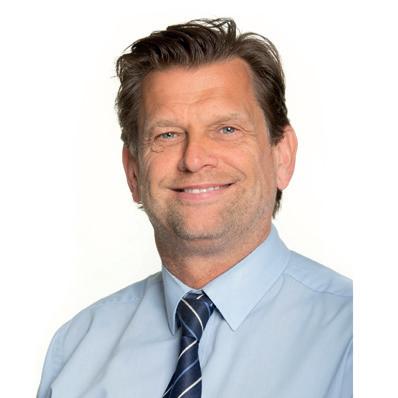

Adam Noble is Director at TSP
A dealer’s core offering of next-day service, high stock availability, simplified ordering and competitive pricing has become ubiquitous and commodified. It has led to dealers being unable to sell at the prices they want (or need) to. With the customers in control and holding all the buying power, they can dictate the prices they pay and where they buy their goods.
Resellers struggle to create a differentiated offering that customers feel offers value and are happy to pay for. As a result, price becomes the ultimate decision factor in the absence of differentiation, leading to the inevitable ‘race to the bottom’.
So now more than ever, to survive and thrive in the workplace supplies industry, it’s crucial for dealers to develop a compelling strategy that distinguishes them from their competitors and creates value that customers deem worth the price.
The first step in making a strategy real is working out the win in order to gain a sustainable competitive advantage – or, in other words, a significant, meaningful idea about how to win.
Why is strategy important?
A well-crafted strategy should provide a guide for growth, competitiveness and success, but it needs to be sustainable to give a business an advantage. Strategic decisions are typically associated with issues such as:
• Long-term company direction: Decide on the type of business you think it should be or want it to be.
• Scope of company activities: Should your business concentrate on what it is doing today or expand its offering by diversifying to added value services?
• Advantage over the competition: Build a strategy that is better or different from those of rivals to give you an advantage.
• Strategic fit with the business environment: Work out what clients need and their business problems and ensure your solution provides the answer.
• Resources and capabilities: Can skills and knowledge within the business be exploited to expand the offering or is an investment required to boost additional capabilities?
The challenge for dealer principals is to build a sustainable long-term strategy that will provide a ‘protective moat’ through a differentiated offer. It is not about being unique – this is not important and in fact can be deemed as high risk to a buyer – but rather about being different relative to the buyer’s other options. This is achieved by creating both real and perceived value for the customer.
For dealers, the pivotal question is when to start looking at strategic options and choices. Below is a simple framework – a favourite of mine – that serves as a guide in making the decisions necessary to create a sustainable strategy.
The purpose of the enterprise:
• Our guiding aspirations
What is our winning aspiration?
Where will we play?
The unique right to win:
• Our value proposition
• Our competitive advantage
The set of capabilities required to win:
The right playing field:
• Where we will compete –our geographies, product categories, consumer segments, channels, vertical stages of production
How will we win?
• Our reinforcing activities
• Our specific configuration
The support systems:
• The systems, structures and measures required to support our choices
What capabilities must be in place
What management systems are required?
Determining a strategy for your business is not an easy process; nor should it be created alone (if possible). Yes, there has to be a decision-maker at the end of the day, but a collective strategy – one invested in by as many people as possible – represents that crucial first step. While the vision for the business may originate from an individual, the strategy to execute that vision necessitates wider buy-in. Securing that buy-in creates purpose, which in turn leads to higher motivational levels; and there are many soft benefits to a good strategy.
I’ve found the above model stimulates debate and discussion and is worth the time, as it will lead to clarity and that all-important buy-in.
It’s about choices
An often-misquoted statement attributed to Henry Ford about sales goes as follows: “Selling is simple: find out what your customer wants and give it to him.” Ford actually said: “If I asked my customer what they wanted, they would have said faster horses.”

There is a clear lesson to learn from this when deciding on strategic options. If you ask your customers right now what they want, they will say better prices or faster/better service – but at no extra cost! If you base your future strategy on this, you will continue to be part of a very big field of like-minded suppliers in that race to the bottom.
Ford was simply advising that rather than concentrating on what your customer wants, you should focus on what they need – but don’t expect them to know what that is. As the late Steve Jobs famously remarked: “People do not know what they want until you show it to them.”
When a good strategy is in place, it must be turned into a compelling and simple sales message
The starting point for determining a strategy lies in gathering information from multiple sources. To truly differentiate, it’s essential to gain input from customers, employees, investors (if you have them), suppliers and even competitors. Ask them what they think. I promise you will see some interesting variety (which is good, as it proves there is no one-size-fits-all solution everyone can copy), but you will also spot some common themes on which to base your decision-making.
When a good strategy is in place, it must be turned into a compelling and straightforward sales message – one that your client (and salespeople) understand and that makes it easier for them to choose you… and harder for them to leave. Ultimately, it should deliver a proposition relevant to your target customers and provide the benefits of a car, not a faster horse!
What’s next?
The goal of this first article on diversification is to stimulate thinking – even action – on the important need for dealers to create a value proposition. I’m afraid the bad news is there is no silver bullet solution. But the good news is there is no silver bullet solution. If there were, everyone would do it and the race to the bottom would begin all over again – and the danger is, eventually, everyone would win!
The next article in this four-part series will see TSP Director Gary Naphtali take a closer look at the sales and customer proposition (read Who ya gonna call...? on page 37 for an interview with Naphtali).

Workplace360 spoke to TSP Director Gary Naphtali about the company’s mission to support dealers and other organisations to improve sales performance through targeted consultancy services
Workplace360: I noticed on LinkedIn that TSP was established in September 2020.
GN: That’s correct, although TSP initially started as a different business. Drawing on my background at Anglo Office Group, TSP was a multi-service solution for companies in London, collaborating with around 24 suppliers that weren’t on the business supplies radar. Recognising their sales and marketing challenges, we also stepped in as their sales arm.
However, as businesses began to reopen postCOVID, the demand for these services stalled. During this time, I undertook a short-term consultancy with RAJA Packaging, which turned into a larger project and kept me away from TSP for a couple of years. When I returned, it was clear the business supplies market had renewed confidence in the future and TSP needed to follow suit.
W360: So, in a nutshell, what does TSP do now?
GN: Simply put, we provide a multifaceted approach to performance improvement, predominantly focusing on delivering sales growth and business development. Whether it’s management, purchasing and supply chain or strategic advice, our goal is to enhance sales. While any of us could work with a business and help improve sales per se, that’s sometimes just a quick fix. If other components of your business aren’t functioning properly and working in line with the sales objectives, sales growth won’t be improved over a longer period. That’s the bottom line.
W360: Who are your primary targets in our sector?
GN: Between myself, Steve Gorham and Adam Noble, we’ve years of experience and knowledge within the workplace supplies sector, with invaluable lessons learned from past successes and, of course, mistakes. We are ideally positioned to support dealers and distributors and it’s also where our passion lies. I firmly believe, as diversification evolves, the dealer market has tremendous potential from a customer perspective and we are here to help realise that.
W360: You offer a full-service consultancy, including marketing design, recruitment, sales strategy and supply chain management. If a dealer needed help in just one area, could they choose only that service?
GN: Yes, absolutely. We frequently begin addressing a single area, which often leads to identifying other needs. Adam, for instance, has been working with clients at
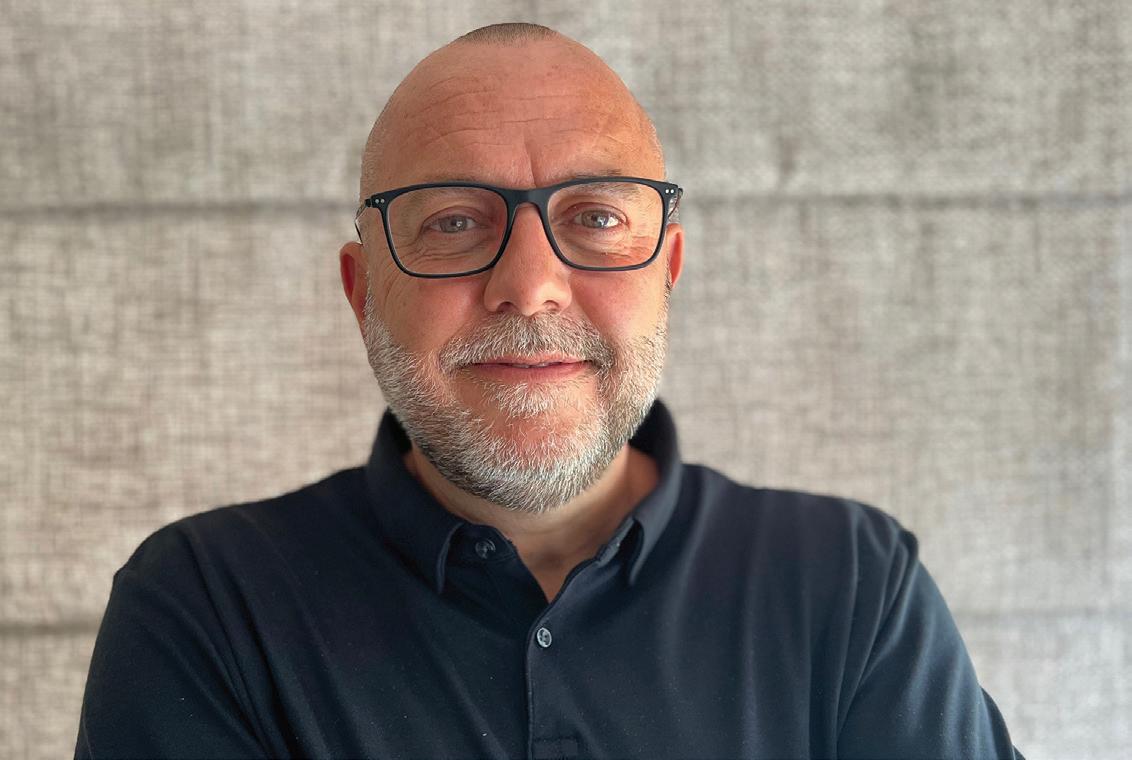
The dealer market has tremendous potential from a customer perspective
an executive level, helping them address core business challenges or identifying opportunities through coaching and mentoring. Training is a typical common entry point. From these start points, we often help identify other areas that may need improvement, such as sales strategy, customer proposition, talent development or recruitment, for example. Clients can choose the services they require based on their specific challenges.
W360: When should dealers give TSP a call?
GN: The hardest part is often just starting the conversation, as most people don’t like to admit there’s an issue, or sometimes realise there is. If a dealer or any business feels they have a problem but aren’t sure what it is, they should reach out. We have a document with common business challenges that can indicate whether you need help. If you can tick off more than a few of these issues, it might be time to seek assistance.
For example, one major red flag is recognising the need for change (diversification is a common one) but being unsure of how to approach it, or even start. Other signs may include having a plan for growth that isn’t working, knowing what needs to be done but not everyone is on board, experiencing poor team communication and/or collaboration, poor (or no) new business conversions, or realising your sales effort has just lost its way a bit and needs re-energising.
It’s often the simple, overlooked issues that can significantly impact a business but can be easily fixed. An external perspective can identify these problems and offer solutions that might not be obvious to those embroiled in day-to-day operations. This insight can be invaluable – even if it’s just for a health check or an MOT of your business, team or indeed yourself.

Economic pressures and a shift towards creative, sustainable stationery are redefining the writing instruments industry.
By Michelle Sturman
Over the past few years, two major trends have steered the trajectory of the writing instruments sector. The first is the creeping tide of digitisation, and the second is, of course, hybrid working. Although more people are returning to office environments as employers seek to reintegrate their workforce into physical spaces, volumes in the traditional office channel remain muted.
There are notable exceptions, however, as hybrid work models drive demand for tools that enhance both individual productivity and collaborative efforts. Whiteboard markers, for instance, have witnessed remarkable growth as in-person meetings and brainstorming sessions regain prominence.
Economic factors, particularly inflation, have significantly influenced purchasing habits. Buyers are increasingly focused on seeking promotional offers and larger value packs or opting for single-item purchases to manage expenses. Contrary to expectations driven by
Customers rarely just buy one pen; they love to have all the colours or designs
remote work, there has been a noticeable trend towards bulk buying for corporate procurement strategies.
“Inflation is more or less evening out,” comments Pentel Marketing Manager Wendy Vickery. However, this doesn’t mean there is less pressure on budgets. “End-users are still looking to achieve the best value for money, although this doesn’t always mean they’re ordering the cheapest products”, she notes.
Durability has become a key influence on purchasing decisions. Products that promise extended use, such as pens with long-lasting ink or mechanical pencils with robust lead, resonate with cost-conscious buyers aiming to reduce the frequency of replacements. “Reliable writing instruments that provide consistent quality are favoured,” remarks Vickery.
Sarah Laker, owner of independent retailer Stationery Supplies, believes there is a cultural shift towards seeing stationery as more than mere implements and has observed a steady growth in pen sales since 2020. She attributes this to the rising popularity of beautiful pens available in pleasing colours, alongside the interest in journalling and calligraphy. “Our customers rarely just buy one pen; they love to have all the colours or designs and often show off their pen collections on social media,” she says.
Vickery notes that where the traditional office sector has been struggling, new markets are flourishing: “The arts and crafts sector, in particular, is experiencing a surge, with products like Pentel’s diverse range of brush-tipped pens leading the charge.” From pastelcoloured pens to glitter felt tips, there is a heightened demand for fun, colourful stationery.
With dealer diversification burgeoning, vendors are keen to highlight other niches across various sectors – each with distinct requirements and preferences. Healthcare professionals, for instance, rely on pens with antimicrobial properties and ergonomic designs tailored for medical settings. “In healthcare, tools such as highlighters and whiteboard and permanent markers fulfil a crucial role in facilitating clear communication and efficient record-keeping,” says Stabilo UK Marketing Manager Vanya Hunter.


Creatives, including artists and designers, demand precision and versatility from the products they use. Fine-liner pens, brush pens and markers with a spectrum of tip sizes facilitate intricate detailing and expressive artistry. Additionally, professionals who take extensive handwritten notes benefit from fast-flowing pens that ensure quick drying and smudge-free writing.
The hospitality industry values writing instruments that enhance guest interactions and operational efficiency. These include pens used during guest check-ins and notepads for room service orders, with branded stationery items serving promotional purposes, to reinforce brand identity with every use. In kitchen environments, there’s a perpetual requirement for permanent markers, which are indispensable for labelling and organisation.
Another expanding market for writing instruments is found in warehousing. Hunter points to the importance of permanent, industrial-grade and fluorescent markers which are essential for labelling and safety protocols. Vickery says there is a demand in this sector for products such as Pentel’s new NF450 permanent
marker which offers a durable, extra-fine tip and is available in four colours. She also highlights the popularity of the NF450 hanging pack, which has quickly become a top-selling wallet across businesses of all sizes.
Writing instrument manufacturers are upping their game, releasing retractable and refillable pens with enhanced features such as improved tipholding systems and noise-reduction mechanisms. Meanwhile, mechanical pencils have evolved with stronger leads to combat breakage, addressing longstanding user concerns.
One standout introduction is Staedtler’s Noris handwriting pen. Launched in January, it is a significant addition to the brand’s iconic range. Drawing inspiration from the widely recognised Noris pencil, famed for its yellow and black stripes, the pen incorporates the company’s patented Dry Safe ink technology, which ensures the ink remains usable even if the pen is left uncapped for several days.
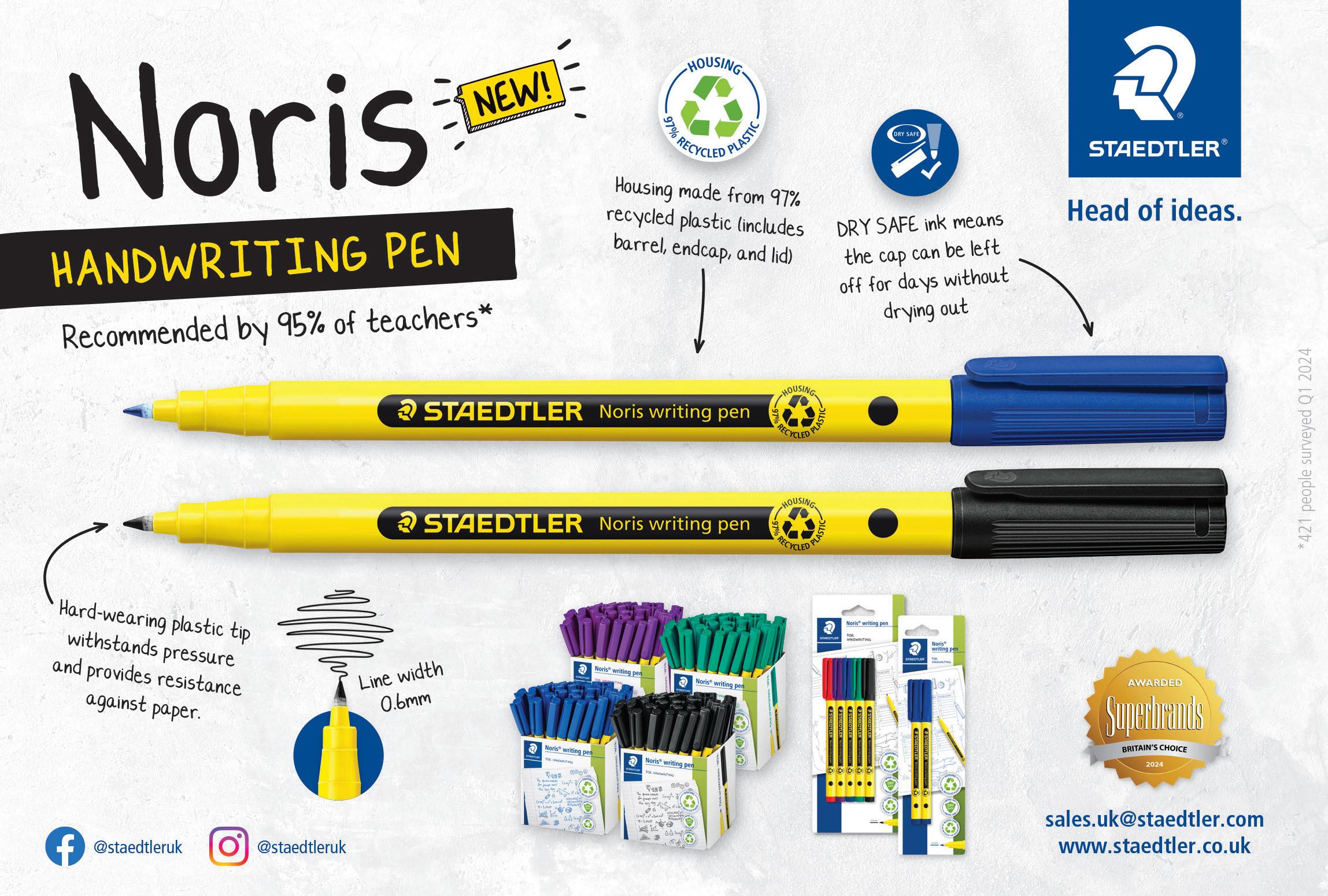
29%
Of Britons frequently purchase stationery items such as pens, pencils, notebooks and papercraft
Source: YouGov
The pen is made from 97% recycled plastic, while the product packaging reflects Staedtler’s commitment to sustainability, with bulk packs crafted from recyclable and recycled cardboard and retail blister cards combining recycled plastic blisters with cardboard.
Pentel, meanwhile, recently launched the Floatune rollerball, showcasing advancements in smooth writing and quick-drying technology. “Floatune features a dual-ball tip system that minimises friction, ensuring a seamless writing experience,” says Vickery.
“With frequent keyboard use, writing on paper can feel alien. Thanks to its next-generation rollerball technology, the Floatune offers the lightest ever writing experience, that even pen and paper refuseniks will enjoy using,” she adds.
As part of Stabilo’s ongoing innovation strategy, the company has recently integrated several technological advancements in its line-up, according to Hunter. “We are releasing these in Germany and Austria as a test market. We also have some exciting new releases to highlight, including a significant launch scheduled for October featuring the BOSS Original. Additionally, in January 2025, new colours will be introduced for our Swing Cool highlighters.”
32%
Of Britons primarily use physical stationery for tasks such as taking notes, making to-do lists and keeping a calendar
Source: YouGov
In an era increasingly defined by environmental awareness, at the very least, customers now expect packaging to adhere to rigorous recycling standards and many are looking for further innovations in eco-friendly options. This shift towards sustainability is evident in products such as the Pentel Eco96 Energel pen, which boasts a 96% post-consumer waste composition and is designed to be refilled. “Most of our top-selling EnerGel range is made using a minimum of 50% recycled material,” remarks Vickery.
The commitment to sustainability extends to Pentel’s artistic offerings. “Our Pentel Arts family includes products such as the Brush Sign Pen, made with 77% recycled material; and our colour and watercolour pencils are FSC-accredited,” adds Vickery.
To achieve climate neutrality by 2025, Stabilo has made significant investments in state-of-the-art packaging technology. These new machines facilitate the production of 100% cardboard packaging at two of its three sites, reducing plastic waste by approximately 30 tons annually.
Explains Hunter: “The new mono-material cardboard packaging will replace the previous paper and plastic

mix, simplifying recycling for customers. This switch is particularly beneficial for several Stabilo point 88 and Pen 68 cases, which will now generate zero waste and use a less energy-intensive manufacturing process.”
BIC, meanwhile, has also been busy on the sustainability front. The company’s iconic BIC 4 Colours pen, for example, was redesigned with a lighter clip and the BIC Boy silhouette saves the equivalent amount of plastic needed to produce more than 2.6 million of these pens every year. Last year, a retractable gel pen made from 78% recycled ocean-bound plastic waste was added to the Ecolutions stationery range, and the company has a target of making all packaging recyclable, reusable or compostable by 2025.
“Sustainability is high on the buying agenda for many of our customers,” affirms Laker. She emphasises a growing consumer preference for pens with recycled properties and refillable options, often with minimal or recyclable packaging. Laker and her team actively educate customers on sustainable choices, ensuring they can make informed purchasing decisions aligned with their environmental values.
Vendors are stepping up their support for dealers, offering tailored strategies and promotional tools to bolster sales and customer engagement across many platforms, including social media. However, Pentel believes in-person communication is still vital in our industry. “Pentel is one of the few writing instruments companies to maintain a field sales force that regularly calls on customers for face-to-face visits to offer the latest promotions, provide product training and discuss merchandising options,” states Vickery.
BIC Key Account Manager Kristian Danielson is eager to reinforce the importance of collaboration between dealers and brand manufacturers: “It’s crucial that dealers reach out to brand manufacturers for product insights and support. Most are eager to assist with product samples and information to help dealers secure new business opportunities.”
Providing support for the launch of its Noris handwriting pen, Staedtler featured it in the company’s back-to-school promotion, aiming to incentivise
It’s crucial that dealers reach out to brand manufacturers for product insights and support
retailers with attractive pricing strategies. Moreover, Staedtler is backing the release of the pen throughout the year with extensive support measures. These include product sampling, targeted social media campaigns, sponsorship of awards and advertising activity. In addition, the company has developed a robust digital toolkit to assist dealers in maximising their marketing efforts.
A new campaign launched by Stabilo further underlines the move to include social media. Highlight What Matters to You uses Stabilo’s iconic BOSS highlighter to amplify personal and emotional messages shared online. It aims to spotlight five impactful themes ranging from advocacy for tolerance to sustainability, with key messaging across social media platforms.
Retail, however, remains key. Stabilo, for example, offers a variety of POS solutions designed to elevate product visibility and drive sales in retail environments. Hunter says the variety of support available includes everything from permanent metal displays that can be illuminated for a “touch of theatre” to semi-permanent free-standing and counter display units. Meanwhile, flexible clip strips allow for strategic placement throughout retail spaces to attract customer attention.
While vendors’ endeavours to boost awareness of the writing instruments category are clearly beneficial for dealers and retailers, Laker emphasises the importance of tailored manufacturer assistance.
“It would be great to see more of the pen manufacturers talking to independent retailers and finding out what we actually need to support our sales,” she explains, advocating for initiatives that include consumer offers, product samples, good in-store signage and appropriately sized window displays designed taking into consideration retailers’ views.

24%
Of 18 to 29-year-olds primarily use digital tools to make notes and write lists
Source: YouGov
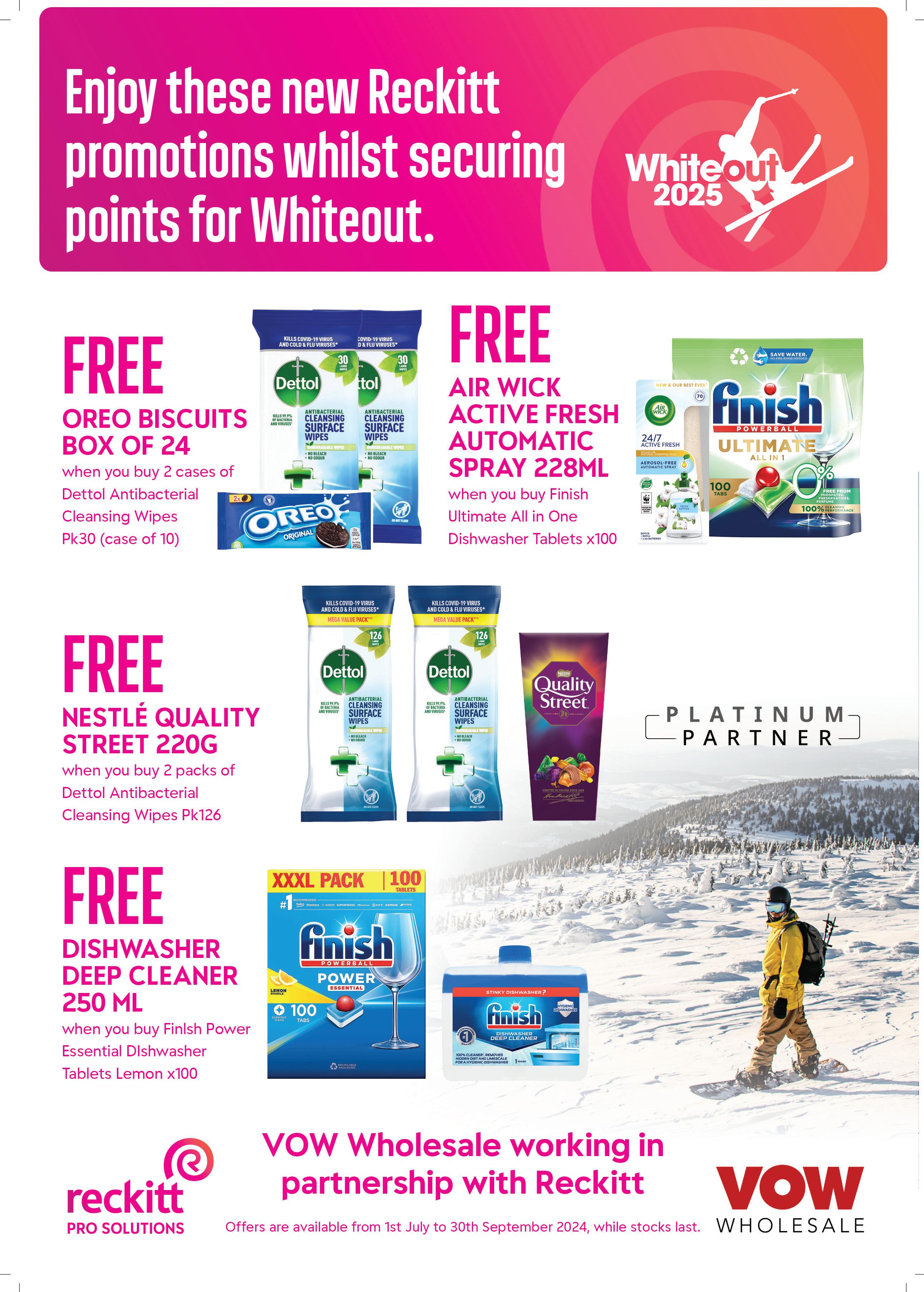
on the pivotal moments and lessons that have shaped his leadership
Workplace360: Congratulations on your 30 years at Brother UK. It’s quite a long tenure with one company. Phil Jones: Yes, people often ask me about it. I think it comes down to feeling continually challenged, which leads to growth. When you’re always learning and developing, and you enjoy the people and industry you work with, time flies. Plus, if you feel like you’re progressing in your career, as I have – eventually ending up running the company – the years slip by.
Some people argue that staying in one place for so long can dull your edge, but I believe it is up to each individual to keep their skills sharp. I attend conferences, read extensively and constantly educate myself. I can now enter a room with anyone and talk about anything.
W360: How did you climb the career ladder? You started as a salesman – was it just the gift of the gab or did someone see something special in you?
PJ: I definitely didn’t start with a natural gift of the gab. My early experiences selling life insurance taught me that. Eventually, I found my way into B2B sales, selling copiers, which suited me better. When I joined Brother UK, I realised I excelled at building relationships based on trust and doing what I said I would do rather than being an aggressive closer.
My first big break came unexpectedly when a colleague left and I had to step up. It came at a time when Brother UK was trying to get its fax business off the ground and I happened to be the only one in the company that knew a lot about them. I proved my worth and eventually moved up through the ranks to Sales
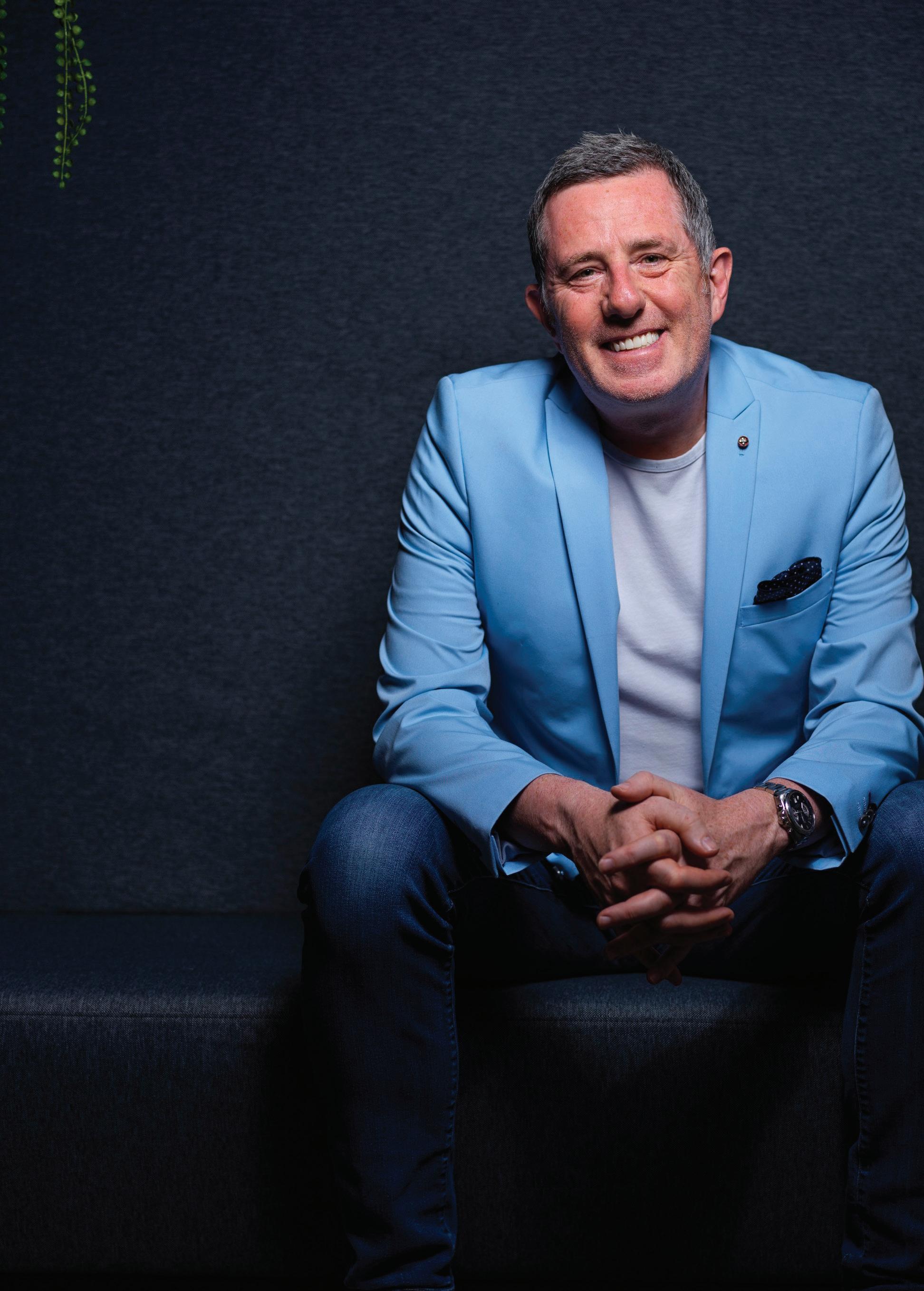

Director and didn’t look back. Although I was a little out of my depth at the time, I focused on creating value and learning. My journey involved a lot of self-reflection and growth which ultimately led to my role as Managing Director in 2013.
W360: If you had to pick one highlight of the past 30 years, what would it be?
PJ: When I walked in as Managing Director. It was an unbelievable day for me and my proudest moment. It was self-affirming that when you’d perhaps had all of those years lacking self-confidence because of your start, suddenly you end up in that role and you go: “Wow, I made it”.
Because of my experience, when I became Managing Director, I started an apprenticeship scheme. Many young people, like me, aren’t academic but are hardworking. I wanted to give them opportunities and it’s incredibly rewarding. In fact, one of our first apprentices, who joined Brother UK aged 17, has just achieved ten years of service. I’m super proud.
W360: I expect you’ve mentored quite a few people over the years, but did you have someone while rising through the company?
PJ: Not really. When I became Sales Director, I was around 30 at the time and it was all about working hard and achieving the numbers. I had gone from a manager of people to a manager of managers – a very different proposition. Luckily, I had a chance meeting with a sports psychologist, which changed everything for me. He told me we couldn’t create a high-performing sales team unless we knew how I worked. He taught me about emotional intelligence (EQ) and self-awareness, which were crucial for my personal growth.
This was a major trigger for me and I absolutely believe that if I hadn’t had that time with him, I would never have been Managing Director. I developed an insatiable appetite to grow and started searching for external mentors and reading extensively, and I also joined the Institute of Directors.
The non-academic became a massive learner later in life. This personal development, combined with technical skills, is what I call mastery – mastery of subject matter and mastery of self.
W360: Sounds like sage advice.
PJ: My #1 tip is to pursue mastery. Some individuals don’t reach their full potential because they only invest in technical skills. You need both EQ and technical knowledge to succeed. Understanding yourself and applying your skills situationally within a corporate culture, business or customer, makes for a compelling proposition. You become a more effective leader when you can read the room. Ignore personal development at your peril if you want to succeed in a corporate organisation or lead your own business.
W360: Our industry is dominated by men. How difficult is it to promote mastery in such an environment?
PJ: It’s a great point. Bias can be dangerous. At Brother UK, we constantly monitor our gender balance and neurodiversity and have about 11% declared neurodiverse people and 44% women in our workforce. However, it’s still two-thirds men at the senior executive level, so there’s room for improvement.
Industry leadership must continue to push for real change. Leaving a strong, diverse organisation behind is part of my legacy because it will contribute to Brother UK’s long-term success.
W360: What else have you learned from your 30 years that you want to highlight?
PJ: You know, I think all I would say is that over these 30 years, I’ve witnessed tremendous change in the industry, especially in the post-pandemic period from 2022 onwards. We’ve all been in constant problemsolving mode due to significant impacts on our revenues. Now is a time for us all to look ahead with a slightly different perspective. Despite the pressures, I’ve always held on to the saying, “Never make a permanent decision on a temporary situation or emotion.”
We must acknowledge these pressures but keep our heads up and horizons clear. We must craft good strategies to ensure the success of our industry, our companies and the people within them.
W360: Final question: I know you like your acronyms. What’s your latest one?
PJ: RACE, which stands for Reliability, Availability, Convenience and Expectation. It’s about the changing environment of customer expectations.
The race for the customer involves ensuring that your product or service is reliable and available when the customer needs it. Convenience is key – making it easy for customers to access and use your product or service. Expectation refers to meeting and exceeding customers’ anticipations, which have been significantly raised by companies such as Amazon, with its next-day delivery through Prime.
Customers now expect things to be quick and on their terms. For instance, if you tell a customer they must wait two weeks for a product, they’ll likely look for a faster option. Similarly, they’ll find another seller if your payment methods aren’t convenient.
Ed’s note: For an extended version of this interview, read this article online in the July/August 2024 issue. Find it in the Magazine section: workplace360/magazine.

Nemo Office Club’s latest conference offered a refreshing mix of business insights
Nemo Office Club brought a ‘Winning Mentality’ to its conference in June as members and suppliers gathered at the Cranage Estate in Cheshire for two days of networking, inspirational business sessions, an exhibition and huge amounts of fun. The event was geared around empowering members to continue to grow their businesses and overcome any challenges thrown at them: a winning mentality. At the heart of this was the power of collaboration, which was evident throughout the business sessions.
The presentations kicked off with insights on using LinkedIn to connect with potential customers and instigate sales. Rather than a run-of-the-mill textbook lesson, the session focused on real success stories, presented by Nemo Office Club’s Alan Calder and Luke Morgan of Morgan & Morgan, who shared case studies of his LinkedIn journey from identifying a potential prospect to nurturing the relationship into an ongoing customer.
• Commercial Dealer: Office Friends
• Online Dealer: Don Ruffles
• Retail Dealer: Morgans Stationery
• Supporting Supplier: CTS Wholesale
• Supplier Account Manager: Tim Gilmore, Pentel

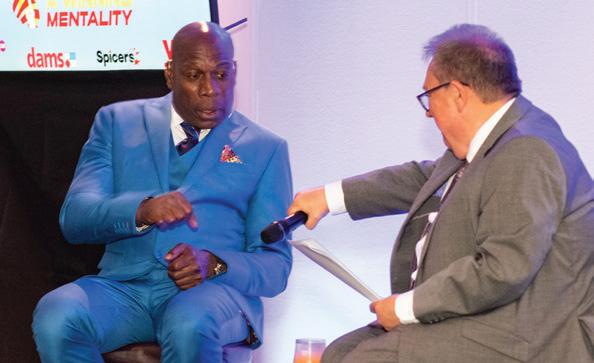

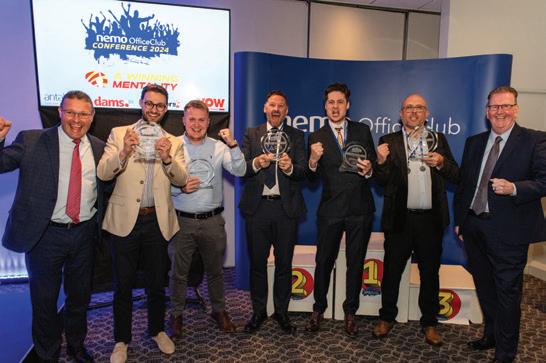
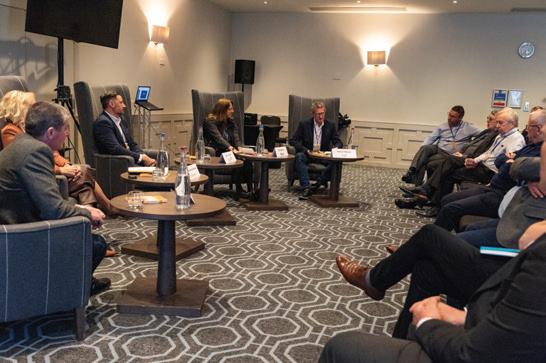
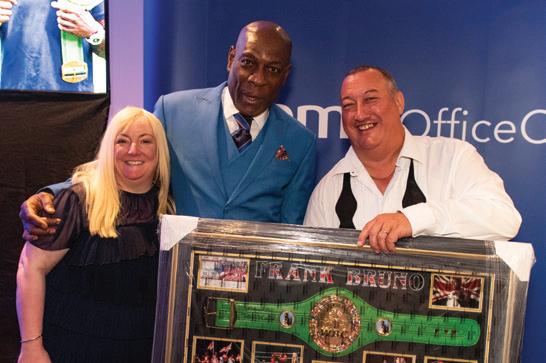
This was followed by a fascinating lesson on how AI can help dealers in their business, including examples of how they can save time on mundane tasks. Chris Williams, an AI consultant, guided the audience through some steps and surprised them with what can be achieved using ChatGPT and how easy this can be.
A unique twist to the conference was Nemo Office Club’s version of hit TV show Dragons Den, as four suppliers – InControl Marketing, Fellowes Brands, Apogee and RightGreen – were given the opportunity to pitch their offering to members, who at the end of the pitch got to vote whether they were ‘in’ or ‘out’.
A real coup for Nemo Office Club was the big-hitting panel that came together to discuss and share thoughts on industry developments, taking questions from dealers in the audience.
Chaired by Workplace360 CEO Steve Hilleard, the session delved into everything from deliveries and diversification to service levels and AI in our industry, as Martin Weedall (COO, Spicers), Kim ThurgoodBrown (Senior Business Development Manager, Exertis Supplies), Garry Wright (Sales Director, CTS Wholesale) and Debbie Nice (interim CEO, BOSS) shared their thoughts and insights with the group.
The awards dinner featured special guest Frank Bruno, who generated positivity in the room as he talked openly about his boxing career and personal battles with mental health. After an inspirational 45-minute interview-style discussion with compere Kev Jones, Big Frank stuck around for photos. On the night, a raffle and auction, including Frank Bruno memorabilia, raised a fantastic £2,328.33 for the Frank Bruno Foundation.
Dealers left invigorated, as Amanda Dark, Office Manager at Kingswood Office Supplies confirmed: “We always come away with fresh ideas and new contacts.” NEMO OFFICE CLUB AWARD WINNERS 2024
• Keep It Local Sustainability Award: Morgan & Morgan
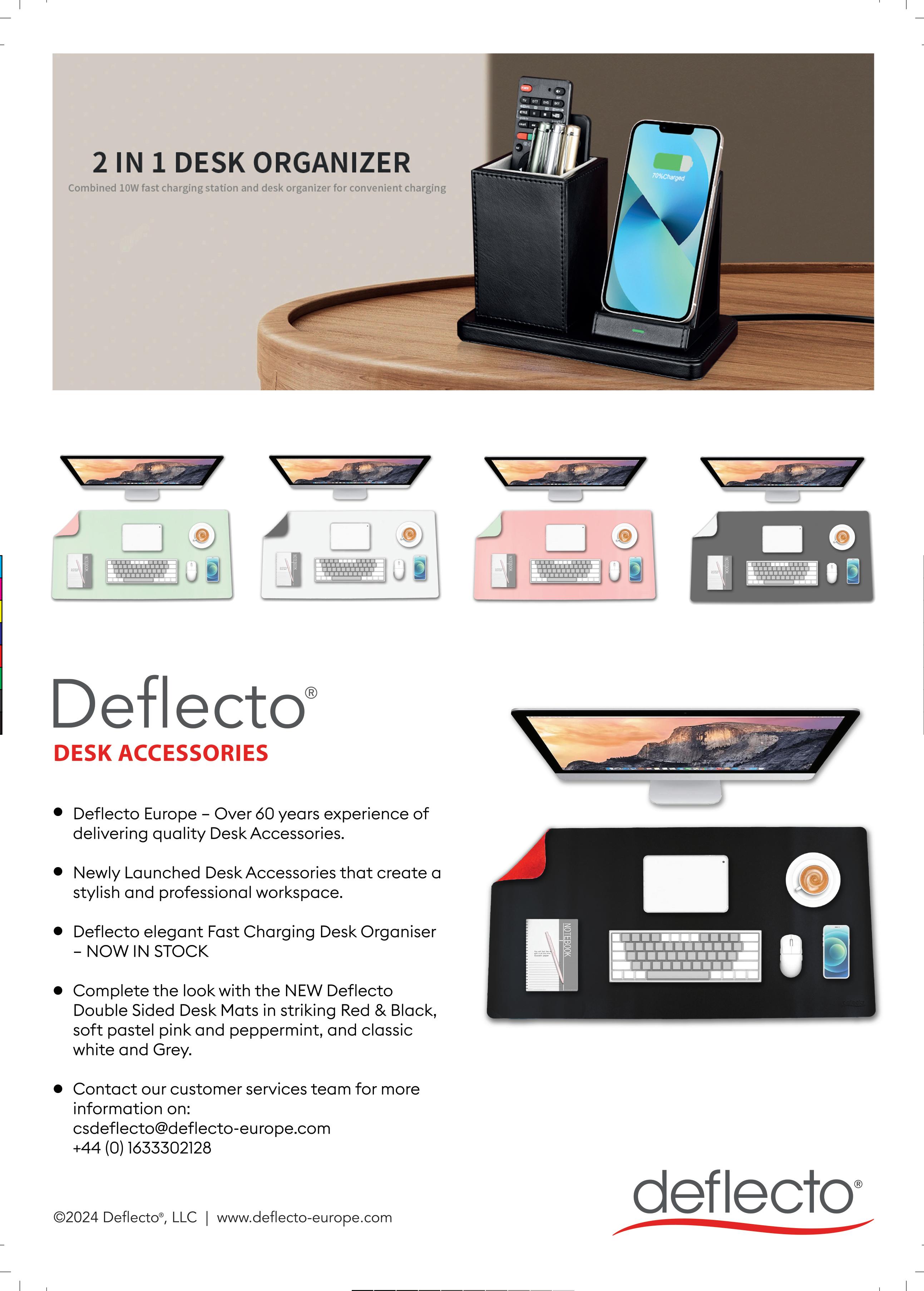



BBSC reports another successful Charity Day





Tand Alex Winstanley, clinching the top spot. They were closely followed by Avery UK’s team of Matt Hopkins, Nico Jean-Jean, Gary Fowmes and Geoff Lewin.
he annual charitable event held by the BOSS Business Supplies Charity (BBSC) took place recently at Carden Park Resort in Cheshire.
On 19 June, over 135 attendees basked in the glorious sunshine, raising an impressive £13,000 to support those in need within the industry.
An event to remember
The day was filled with camaraderie, friendly competition and heartfelt tributes. The atmosphere was vibrant with excitement and generosity as participants engaged in the day’s activities including golf, spa, Segway riding and archery. Attendees enjoyed a buffet dinner, and the evening culminated with BBSC’s raffle, golf prize ceremony and renowned auction. A highlight of the auction was Uni Mitsubishi Pencil Company’s John Allaway taking home the Ronaldo shirt donated by Raj Advani of Exertis Supplies, in memory of Tim Holmes.
The charity is immensely grateful for the overwhelming support
The individual golf competition showcased impressive talent. Tim Beaumont put up a strong fight as runner-up, but it was Shane Owen from Hamelin Brands who emerged victorious, proudly receiving the Tim Holmes Trophy, presented by two of Tim’s sons. The team competition was equally thrilling, with Pukka Pads’ team, consisting of Alex Bonarius, Jess Stott, Chris Stott
Special mentions go to Gary Clark, who won the Beat the Pro challenge, Tim Capper for the Longest Drive, Gray Richmond for Nearest the Pin and Darryl Brunt, who took home the Wooden Spoon.
A tribute
In a touching moment, Philip Wesolowski led a heartfelt remembrance for beloved colleagues who are no longer with us, including Tim Holmes, Steve Bilton, Ken Trenberth and Ed Barnshaw. Their memories were honoured throughout the event, highlighting the strong sense of community and support that defines BBSC.
BBSC Chair Kelly Hilleard expressed her gratitude for the tremendous support from the industry: “We had another incredible Charity Day. The weather was perfect, allowing golfers to enjoy a beautiful course, spa attendees to bask in the sunshine, and outdoor activity participants to explore the grounds on Segways.
“The charity is immensely grateful for the overwhelming support from across our industry, with many companies contributing attendees, raffle and auction prizes and substantial sponsorship. Thanks to their generosity and the expertise of auctioneer Jason Stephen, we raised a significant amount that will enable us to assist even more families.”
With the success of this year’s event, the BBSC is already looking forward to next year. The Charity Day will again be held at Carden Park, promising another day of fun and industry spirit. Details of the 2025 event will be announced soon.






The 2024 edition of the Ride of Life (ROL) charity cycling event proved a resounding success as cyclists embarked on a challenging 100 km route – with no breakdowns! – starting and finishing at the picturesque Bedford Rowing Club. Held on 17 May, the event brought together participants from the business supplies industry, all united by a shared mission: to champion the cause of the Institute of Cancer Research (ICR). So far, approximately £7,500 has been raised to aid in the fight against cancer.
The ride kicked off early in the morning, with 13 cyclists – including ICR’s Pascale Morese – navigating a scenic route through the Bedfordshire countryside through rolling hills and over flat terrains. Buoyed by the lovely weather following days of rain, local supporters and volunteers lined the route, cheering on the riders and adding to the sense of community spirit.
Riding to success
Organised by a dedicated team of volunteers and sponsored by a consortium of businesses, the Ride of Life has become an annual industry highlight. Event coordinators David Richardson and Pelltech General Manager Matthew Whelan expressed their gratitude to all participants and supporters: “We were thrilled with the turnout and the amount raised this year. Every
cyclist who took part and everyone who supported them has contributed to an important cause. The funds raised will go a long way in supporting the innovative work being done at the ICR.”
Every cyclist who took part and everyone who supported them has contributed to an important cause
The success of the 2024 ROL sets a positive precedent for future events and inspiration for our sector’s cycling enthusiasts to continue their support for cancer research. Plans are already underway for next year’s ride, with hopes to raise even more funds and awareness for this crucial cause.
Special thanks are extended to all involved in organising the event, including the jersey sponsors: Djois, Integra Business Solutions, Hamelin Brands, Uni Mitsubishi Pencil Company and Workplace360, as well as the dedicated volunteers who lent their time and expertise, including Sandra Hastings, Vicky Stapley, Frances Stephen and Annette Richardson.
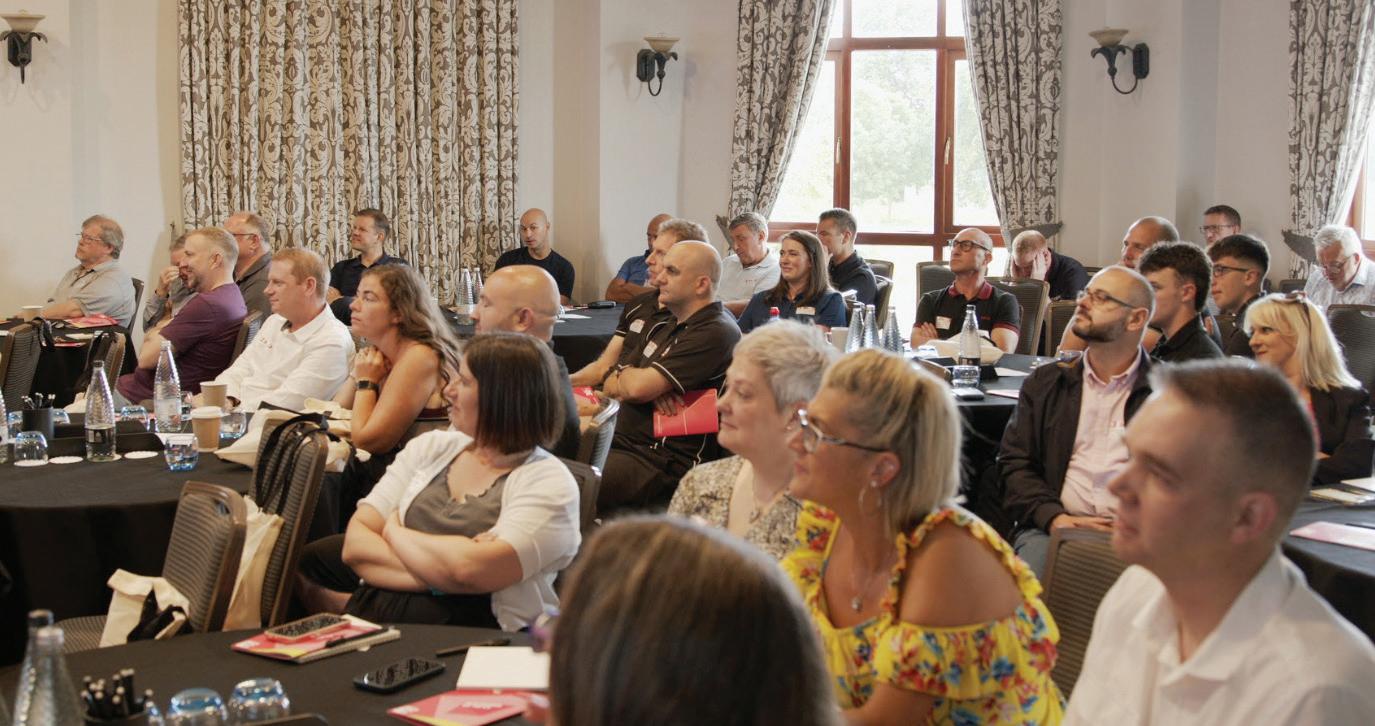

This year’s Superstat conference was a high-energy event promoting partnerships, knowledge sharing and business excellence
Taking place on 27 June at Belton Woods in Grantham, the Superstat Summer Showcase proved to be a lively and inspiring event this year. Sponsored by Exertis Supplies and supported by Prima Software, CTS Wholesale, Reckitt Pro Solutions and Antalis, the conference was packed with networking opportunities, insightful talks and celebrations of excellence.
The event featured captivating speeches, headlined by Jamie Morton of SAS: Who Dares Wins fame. Morton enthralled the audience with stories from his career in the SAS, his experiences on the TV show and his current role as an 8,000 m+ mountain guide. His talk intertwined anecdotes with lessons on competitiveness, determination and goal achievement, which resonated deeply with the business-minded attendees.
Exertis Supplies Managing Director Andrew Beaumont provided a comprehensive company update. He emphasised the potential of the company’s new warehousing space, the addition of 3,000 product lines over the past year and the introduction of a revamped marketing portal offering extensive free digital collateral to dealers.
The open forum was a highlight, featuring a panel of suppliers from key categories: workwear (Beeswift), furniture (Dams Furniture), packaging (Antalis), catering and cleaning (Reckitt Pro Solutions), ergonomics (Fellowes Brands), and wellbeing (Eat Fruit).
All shared valuable selling tips, target demographics and essential information to help members capitalise on new opportunities. The interactive session saw attendees sharing their own experiences, making for an informative and collaborative hour.
During the supplier exhibition, dealers navigated the stands of 34 exhibitors representing a diverse range of categories, including workwear, warehousing, IT, safety, technology and software and office supplies. Among the new suppliers making their debut were Eat Fruit, Flashy Cactus, Apogee and Buronomic, each bringing fresh offerings to the table.
The night before the one-day conference set the tone for a relaxed and informal backdrop for networking and social activities, which included a welcome summer BBQ and 1990s culture quiz. Following the conference and exhibition, a drinks reception and awards dinner featured a band playing 90s club classics, rounding off the event with a touch of nostalgia and celebration. James McKeever, Group Sales Director of Sovereign Business Solutions Group summed up the sentiment of many attendees: “The 2024 sales conference was the best one yet – the atmosphere and mixture of forward-thinking, like-minded businesses really added to a fantastic location and extremely professionally organised event.”
SUPERSTAT AWARDS 2024
• Marketing Excellence: Rainbow Office Supplies
• Salesperson of the Year: Natasha Reid and Lucy Jackson from Office Evolution
• Dealer Excellence (£4 million+): Warrens Office Supplies
• Dealer Excellence (£2.5-£4 million): Blakes Workplace Solutions
• Dealer Excellence (Up to £2.5 million): OS Workplace
• The Tim Holmes Memorial Cup for the Biggest Exertis Growth: Blakes Workplace Solutions
Supplier award winners
• Distributor of the Year: Exertis Supplies
• Brand of the Year: Fellowes Brands
• Exhibitor Stand of the Year: Nestlé
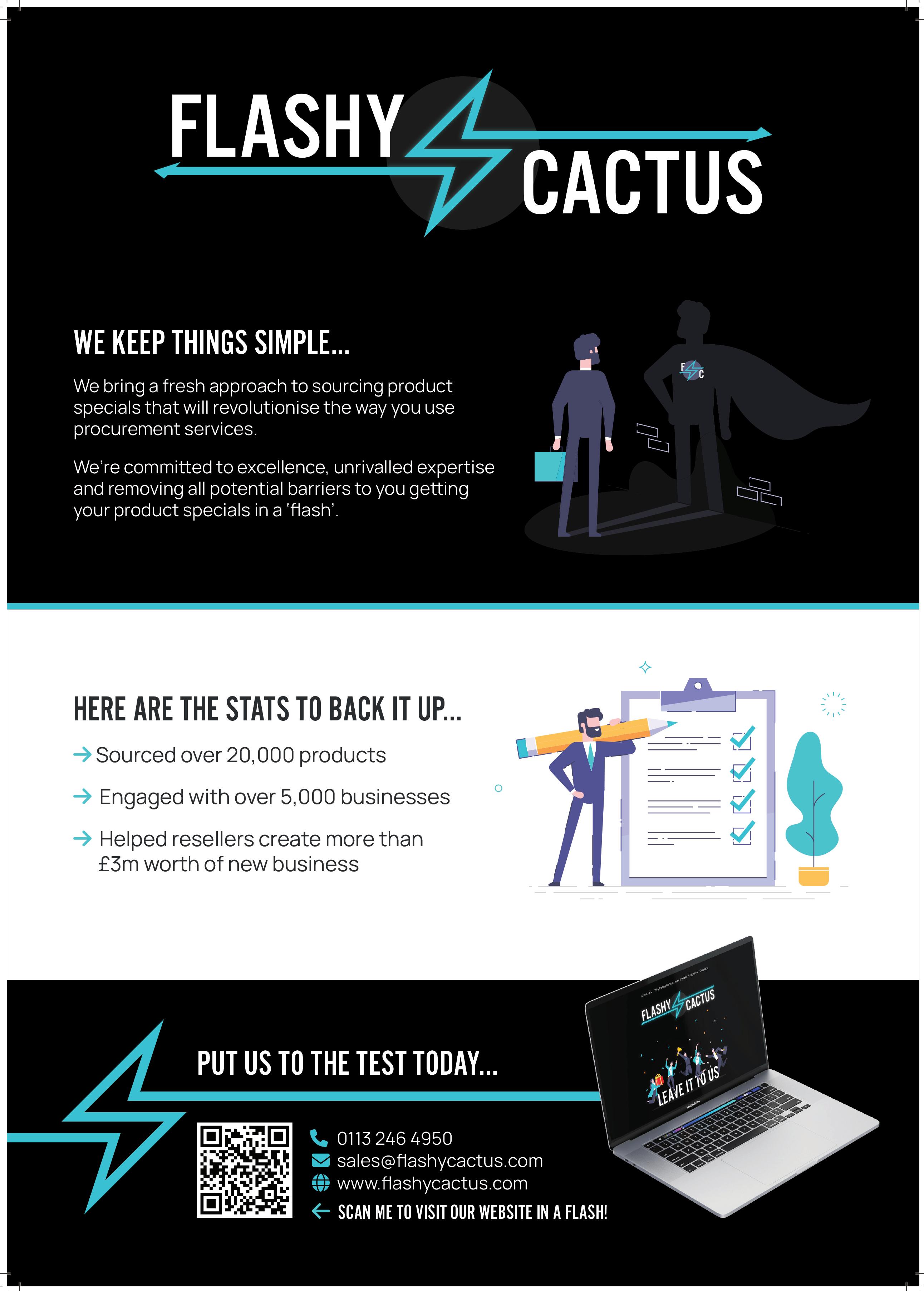

Identifying your ‘why’ can fuel a purpose that transforms your approach to life and business
Aquestion that recently trended on social media following this year’s London Marathon sparked widespread reflection. It is a simple question – ‘What is your why?’ – but one which is often hard for many to answer.
At Office Power, we have dedicated considerable time recently to exploring ‘what is your why?’ Our team members have all attempted to answer the question. While everyone gave slight variations, we all ended up with a similar response: a deep-seated passion for this industry and a fire that none of us want to see fizzle out out, which is inspiring.
In my current position, I have the privilege of working closely with many dealers that are constantly adapting to our ever-changing world. One of the first things we strive to understand is their ‘why’. This question is vital not only from a business perspective but also in their personal lives. Are they driven by the desire for a sense of accomplishment by growing the company to a specific size? Do they aim to retire comfortably with passive income? Or perhaps they dream of cashing in and selling the company to move to a warmer climate?
Once we have uncovered their motivations, I strive to help them realise their goals because I can now see their vision and we can work together with a more meaningful sense of purpose.
FINDING ANSWERS
But how do you find the answer for yourself? This is a question I have pondered over for years and I’m still not sure I have unearthed the answer. In my quest for clarity, I decided to apply business strategy to my life in
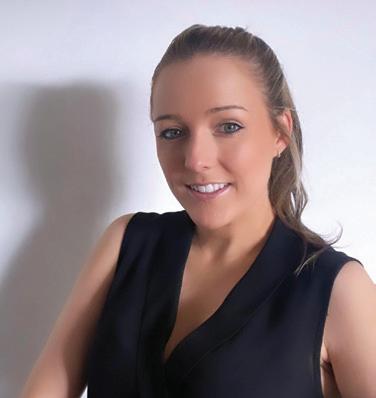
Helen Batstone is Commercial Director at Office Power
an attempt to find out. After all, why not use the same logic that drives business growth in your personal life?
If you wish to try this approach, imagine a scenario where you have achieved everything you want. What does that look like? What are you doing? Where are you? Who are you with? The next question is the most important: how does it make you feel? The point is to recognise that you are not chasing the scenario but the feeling it evokes.
This is now your mission statement. It is your ‘why’. Mine? I envision myself atop a cliff, with rainforest behind me and the horizon in front of me. Specifically, I picture the Petit Piton in St Lucia. What do I feel at that moment? Freedom.
The point is to recognise that you are not chasing the scenario but the feeling it evokes
Once you identify your ‘why’, you can begin to assess where it’s thriving or lacking in key areas of life such as career, finances, social life and health. Conduct a situational analysis of your current status in each area. Then, write your goals for where you want to be and break each one down into clear, actionable objectives.
For example, if I apply my ‘why’ (freedom) to a key area of my life (finances), one goal could be to achieve financial freedom. My situational analysis reveals where I am now – not quite financially free! From there, I can create a list of objectives to help me reach my goal. These might include completing a course to improve my financial knowledge or creating a digital asset that can be sold for passive income.
I genuinely believe this approach can help if you’re unsure of your ‘why’ and I hope this brief outline helps or inspires someone, somewhere.
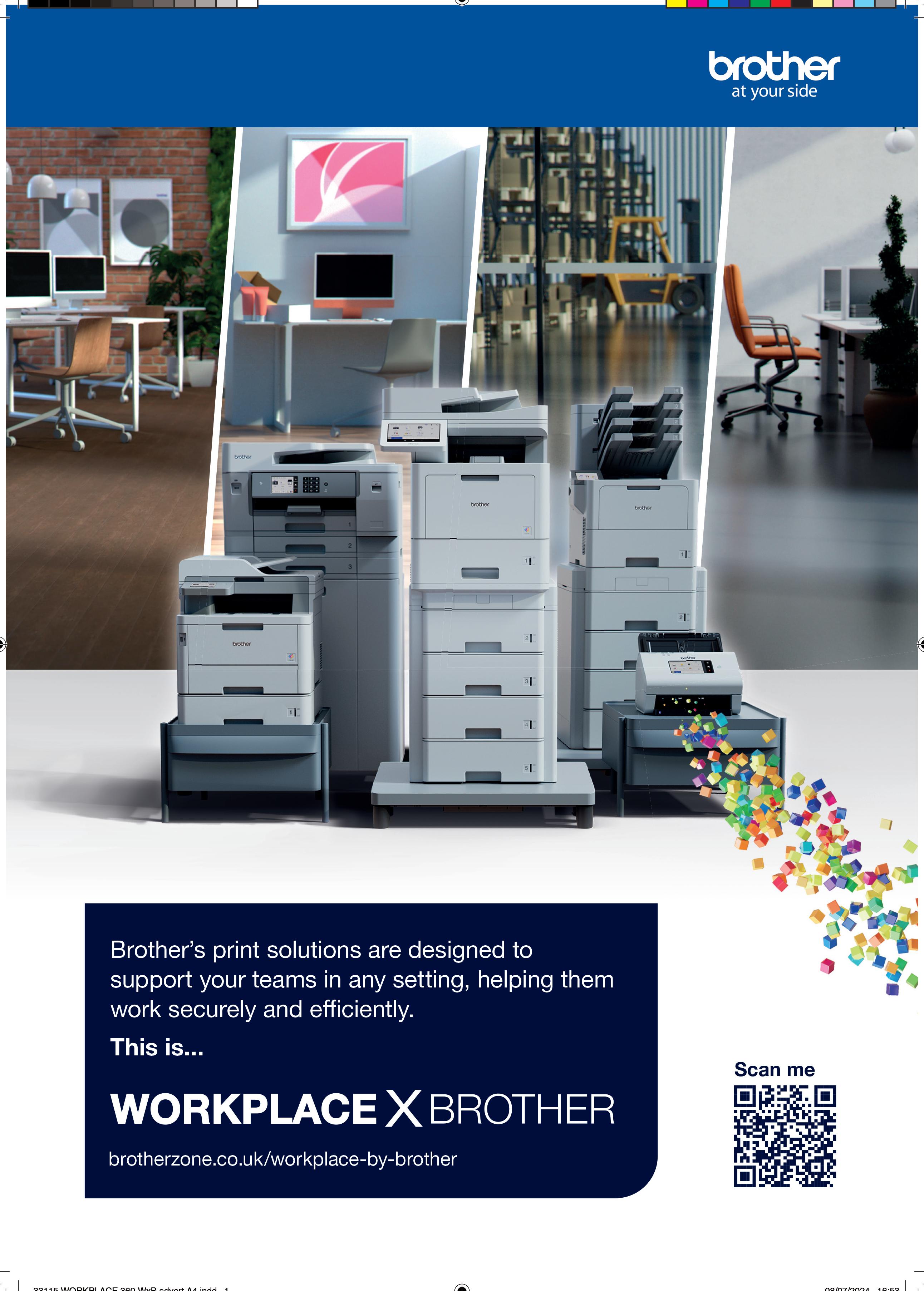


Favourite holiday so far?
Florida with my family. You just can’t beat Walt Disney World and Universal Studios.
Who is the most famous person you’ve met?
Through work events, I’ve been lucky enough to meet the likes of Vernon Kay, Frank Bruno and Chris Akabusi and I’ve also chatted with Harry Redknapp. However, probably the most famous person I’ve met – and played golf with – is Colin Montgomery.
Pet peeves?
There are a few! Sunday drivers, slow walkers, frustrating websites and rude people.
Most embarrassing industry moment?
To save her the embarrassment, I won’t name names, but a lady in the industry called me Jason for about three years every time I met her. I didn’t have the heart to tell her any different.
What’s something new happening in your life?
I’m about to travel to the West Coast of America for the first time with my family.

Best concert you’ve ever been to?
Madonna’s The Celebration Tour at the O2 last year.
What is one thing people would never guess about you?
I play the lead role in a local panto every February – next year it’s Aladdin! Tickets will sell fast!!


Where is the one place you’ve always dreamed of going? That’s easy, Australia.
If you could instantly acquire one skill, what would it be?
Speak a foreign language fluently.
What topic do you enjoy talking about the most?
Obviously CTS Wholesale, but apart from that, probably football.
What’s the weirdest online purchase you’ve made?
Beard dye during lockdown. It turned my beard green!

What’s the synopsis for a novel you’d write?
It would be a tale of an ordinary boy who dreamt big and grew up to be the biggest and best salesperson in the workplace supplies industry.
What’s the best compliment you’ve ever received?
At this year’s BOSS Business Supplies Charity Day, I played the Beat the Pro hole. I chipped the ball through the trees and over a bunker to within 3 ft of the hole.
The Pro said it was the best golf shot he had ever seen!
Name three items on your bucket list.
• Driving the North Coast 500 in a Porsche 911
• Playing at the Augusta National Golf Club in the US
• Riding the world’s fastest zipline
The world’s fastest zipline at Penrhyn Quarry in North Wales

What is the bravest thing you’ve ever done? Have children! Other than that, fishing in Alaska while being surrounded by orcas.
